DashClicks Blog
The industry's top experts offer their best advice, research, how-tos, and insights—all in the name of helping you level-up your business and online marketing skills.
Join Us!

How White Label SEO Helps Agencies Deliver Consistent Quality
For many digital marketing agencies, SEO represents both an opportunity and a challenge. Clients don’t just pay for SEO, they expect consistent, measurable outcomes: higher search rankings, increased website traffic, qualified leads, and long-term visibility. Meeting these expectations month after month, however, is far from simple. SEO is a complex, multi-layered discipline, and even experienced in-house teams can struggle to maintain consistent results without a structured, repeatable approach.
This is where white label SEO comes in. More than a simple outsourcing solution, it acts as a fulfillment engine that enables agencies to deliver high-quality, reliable results across every client engagement. The trend is unmistakable: digital marketing agencies now rely on white label SEO to manage the complexity of campaigns while maintaining service quality. Meanwhile, demand for SEO talent continues to rise, up approximately 45% year over year, yet qualified professionals remain in short supply, creating a structural challenge for agencies seeking to scale.
The difficulty is not just operational; it’s systemic. To understand why agencies often struggle with inconsistent SEO outcomes, it helps first to examine the key factors that make traditional agency models vulnerable to variability in execution and performance.
Why Quality Breaks Down in Traditional SEO Delivery?
1. SEO Is a Multi-Disciplinary, Continually Changing Field
SEO today is far more complex than simply optimizing a few keywords on a page. Modern SEO is an interconnected ecosystem that requires expertise across multiple disciplines. Agencies must balance technical SEO, on-page optimization, content strategy, link building, local SEO, Core Web Vitals, schema markup, and analytics. Each area influences the others. For example, slow site speed (technical SEO) can diminish the effectiveness of even the most compelling content, while poor internal linking can limit the visibility of pages, reducing the impact of link-building efforts.
Many agencies rely on generalists or small teams attempting to cover all these areas simultaneously. While these teams may be talented, the sheer range of responsibilities can lead to uneven execution. Benchmarks show that agencies leveraging specialist teams, where experts focus on individual aspects of SEO, can achieve traffic growth of 125–180% within a year. In contrast, generalist approaches often produce inconsistent results, with fluctuations in rankings and engagement depending on who is handling the work each month.
The takeaway is clear: SEO is no longer a single set-and-forget tactic. It requires coordinated expertise across multiple disciplines, and neglecting even one area can significantly undermine overall performance.
2. Resource Constraints Lead to Variable Execution Quality
Building an in-house SEO team is expensive. Salaries for experienced SEO professionals can range widely, and when you factor in benefits, ongoing training, and subscriptions to essential tools like Ahrefs, SEMrush, or Screaming Frog, costs can quickly exceed six figures annually. Many agencies, particularly smaller ones, treat SEO as a secondary offering rather than a core service. Teams are stretched thin, juggling multiple clients and responsibilities.

Image Source: Search Engine Journal
The practical result is uneven service delivery. Some clients receive meticulous attention, with timely audits, optimized content, and regular performance reports. Others may experience delayed deliverables, missed optimization opportunities, or incomplete analysis. Over time, this inconsistency can erode trust, affect client satisfaction, and limit opportunities for upselling or renewal.
Variable execution quality isn’t a reflection of skill; it’s a consequence of stretched resources and insufficient processes. Agencies need a way to deliver consistently high-quality SEO without overburdening their internal teams.
3. Scalability Breaks Without Structured Fulfillment
Growth brings its own challenges. As agencies expand, internal teams often struggle to keep pace with an increasing client base. Without structured processes, scaling can lead to diluted service quality. Training new hires takes time, and even experienced staff cannot instantly absorb additional projects without affecting performance.
This is where many agencies hit a ceiling. Internal limitations restrict how many clients can be served effectively. Studies show that agencies with inconsistent workflows see declining performance metrics, higher error rates, and rising client churn as their portfolios expand. Without a reliable, repeatable system, scaling becomes a risk rather than an opportunity.
Structured fulfillment, where each task follows a standardized, proven process, ensures quality remains consistent regardless of team size or client volume. It’s a critical step for agencies that want to grow sustainably while maintaining client satisfaction.
4. Client Trust Erodes When Delivery Is Inconsistent
Clients judge agencies on reliability as much as results. Even high-quality work can fail to impress if reports arrive late, KPIs fluctuate unpredictably, or content publishing is sporadic. Consistency is a key component of trust.
Research indicates that agencies using professional white label services report 28% higher client satisfaction scores. Relationships also last longer, showing that predictable, dependable delivery strengthens loyalty.
The problem isn’t a lack of expertise. Traditional in-house models often fall short because they cannot guarantee scalable, repeatable execution across all SEO disciplines.
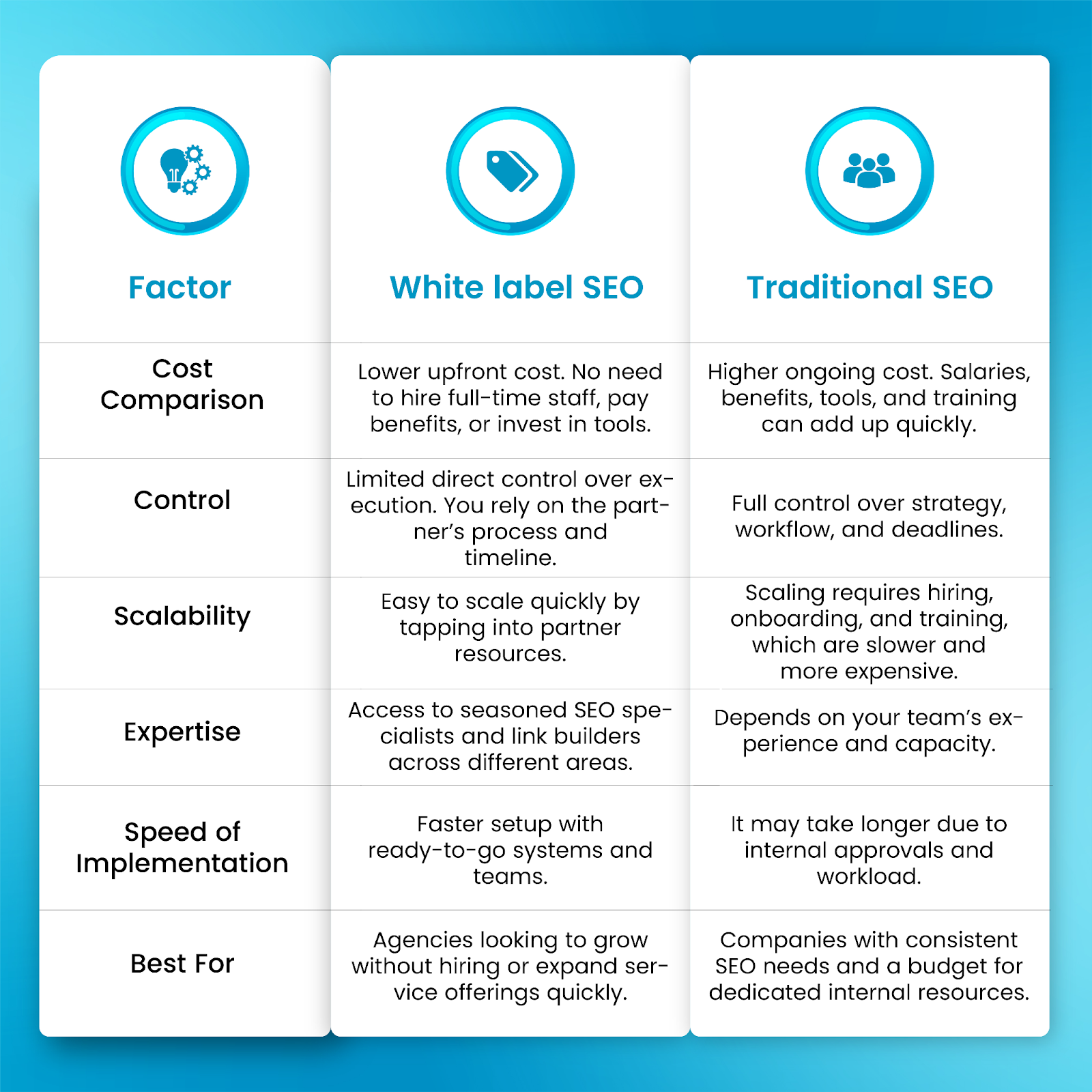
White label SEO solves this by providing a structured, specialist-driven approach, ensuring every client receives consistent, high-quality service every month. For agencies aiming to scale without compromising client trust, it’s a solution that directly addresses both operational and perception challenges.
How White Label SEO Enables Agencies to Deliver Consistent Quality?
White label SEO addresses the challenges agencies face by providing specialized expertise, standardized workflows, and scalable execution. This allows agencies to meet client expectations consistently, without overextending internal resources or compromising service quality.
1. Specialized Expertise Ensures Quality Across Disciplines
White label SEO providers staff dedicated specialists in every critical aspect of SEO, including:
- Technical SEO
- On-page optimization
- Content strategy
- Link building
- Local SEO
- Analytics and reporting
Having experts in each discipline ensures that every SEO component is executed with precision. Agencies using white label partners can offer advanced services, such as international SEO, industry-specific optimization, and hyper-local campaigns, without the need to hire separate in-house teams.
The result is consistently high-quality outcomes for every client, regardless of project complexity or scale. For example, an agency can confidently pitch a multi-location campaign with local SEO audits and optimization across dozens of regions, knowing the white label team has the expertise to execute flawlessly.
2. Predictable Quality via Proven Workflows and Processes
Leading white label SEO providers rely on documented, repeatable workflows that cover:
- Keyword research and content planning
- Technical audits and site fixes
- Publishing schedules and content calendars
- Link-building campaigns
- Reporting and analytics templates
These standardized processes ensure that every client receives the same level of service month after month. Predictable execution minimizes fluctuations in rankings, traffic, and engagement while strengthening client confidence in the agency’s capabilities.
Agencies no longer need to worry about inconsistent delivery due to staff bandwidth or turnover; the workflow guarantees professional, reliable results.
3. Scalability Without Quality Dilution
One of the biggest advantages of white label SEO is the ability to scale services without overloading internal teams. Agencies can onboard new clients, expand service offerings, or handle seasonal spikes in demand without sacrificing quality or timelines.
Smaller agencies, in particular, can compete with larger firms by offering comprehensive SEO services without the overhead of building large in-house teams. This elasticity allows agencies to grow strategically while maintaining high client satisfaction.
4. Branded Consistency Enhances Client Trust
White label SEO deliverables are branded under the agency’s identity. Reports, dashboards, audits, and content carry the agency’s logo and voice, creating a seamless experience for clients.
Consistent presentation and communication reinforce professionalism. Clients receive not only technically sound SEO work but also polished, branded deliverables that reflect the agency’s quality. This strengthens trust, boosts retention, and positions the agency as a reliable long-term partner.
5. Cost Efficiency Allows Investment in Quality
Building and maintaining an in-house SEO team can be expensive, with salaries, benefits, training, and premium tools quickly adding up. Partnering with a white label provider can reduce these costs.
Savings can then be reinvested into:
- Enhanced client strategies
- Additional service offerings
- Marketing and business growth initiatives
This approach allows agencies to maintain high operational quality without stretching financial resources, giving them a competitive advantage while protecting margins.
6. Faster Turnaround and Time to Market
Offloading execution to a white label SEO partner accelerates campaign launches. Agencies can deliver results quickly, building early wins that strengthen client confidence and demonstrate value immediately.
Faster time-to-market also reduces churn, improves client satisfaction, and allows agencies to respond to market trends or seasonal opportunities without delay. The ability to act quickly and deliver consistently positions agencies as agile, capable partners in their clients’ success.
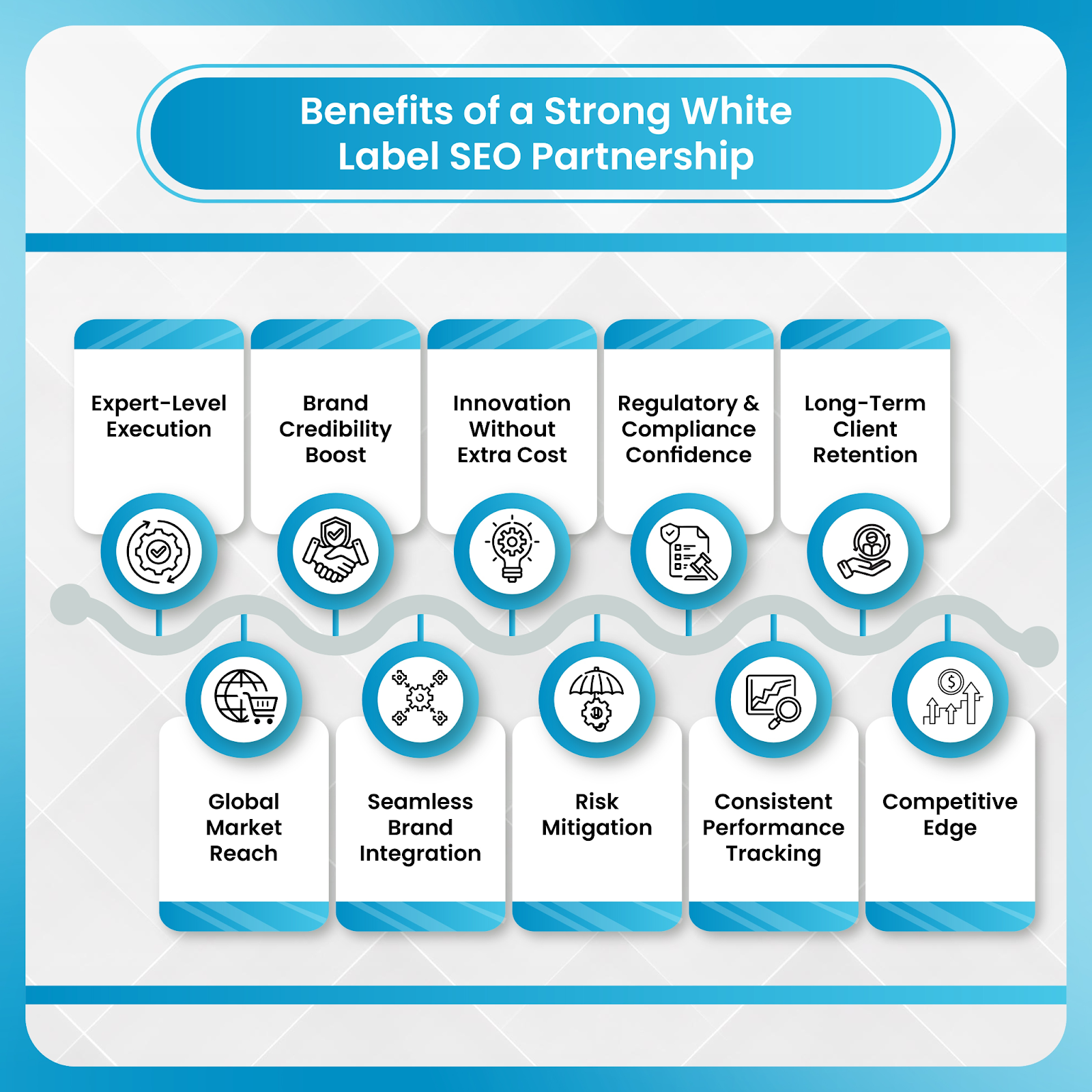
How DashClicks Helps Agencies Deliver Consistent Quality?
DashClicks is a leading provider of white label SEO services, offering agencies a platform to consistently deliver high-quality results across all clients. Their approach combines centralized expertise, standardized workflows, and scalable delivery, ensuring that agencies can meet client expectations without overextending internal resources.
- Centralized SEO Expertise: Their platform provides a full-service team of specialists covering every critical area of SEO, including technical SEO, on-page optimization, content strategy, link building, and local SEO. By consolidating expertise in one place, agencies can ensure that no aspect of a campaign is overlooked, even for complex, multi-location, or industry-specific projects.
- Standardized Workflows: All campaigns follow repeatable, documented processes, from keyword research and content planning to site audits, publishing schedules, and link-building campaigns. These standardized workflows ensure predictable, high-quality outcomes for every client, reducing variability and strengthening agency credibility.
- Scalable Delivery: With DashClicks, agencies can grow their client base or expand service offerings without hiring additional staff. The platform’s elastic capacity allows agencies to handle peak demand or seasonal campaigns efficiently, maintaining service quality while scaling operations.
- Branded Reporting: Client dashboard, reports, and deliverables by DashClicks are fully customizable and branded under the agency’s identity. This creates a seamless client experience, maintaining professionalism and trust while presenting the agency as the primary point of expertise.
- Flexible Packages: Their platform accommodates a range of agency needs with monthly management plans, project-based work, or on-demand campaigns. This flexibility allows agencies to offer tailored solutions for clients of all sizes and industries without the burden of additional infrastructure.
- Support and Quality Assurance: Dedicated account managers oversee every campaign, ensuring that execution meets the agency’s standards. Regular quality checks and clear communication streamline client interactions and minimize the risk of errors or missed opportunities.
By integrating DashClicks’ white label SEO services, agencies gain a reliable partner capable of delivering specialist execution, predictable quality, and measurable outcomes. This allows agencies to focus on strategy, client relationships, and growth, while leaving execution to experts who can consistently deliver results.
Consistency Wins Retention and Revenue
In today’s competitive digital landscape, consistent quality isn’t optional; it’s essential. Reliable, high-quality SEO builds client trust, strengthens relationships, and drives long-term retention. White label SEO is more than outsourcing; it’s a structured system that ensures predictable, repeatable results across every aspect of a campaign.
Agencies that leverage white label SEO solutions, such as DashClicks, gain several key advantages:
- Execution Bandwidth That Scales With Demand: Agencies can take on more clients, expand offerings, or manage seasonal campaigns without overloading internal teams.
- Specialist-Driven Workflows That Reduce Variability: Each aspect of SEO, from technical audits to content strategy and link building, is handled by experts, ensuring consistent quality.
- Predictable, Measurable Outcomes That Build Confidence: Clients receive reliable reporting, timely results, and tangible improvements, reinforcing trust in the agency’s capabilities.
By turning SEO into a dependable, systematized service, agencies can shift their focus from juggling execution to driving strategic growth and client success. With white label partners handling the technical delivery with precision and consistency, agencies can scale confidently, strengthen client relationships, and ultimately increase retention and revenue.
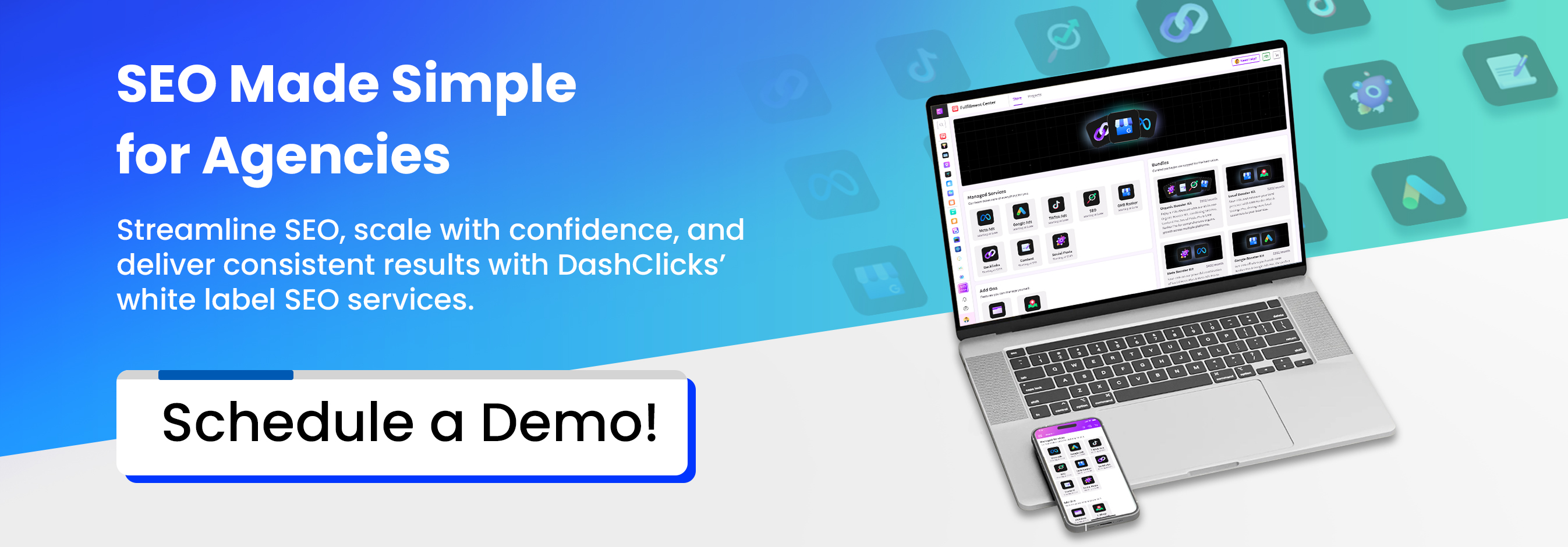

White Label Facebook Ads for Multi-Offer Campaigns
Managing multiple offers has become the norm for many agencies. As clients expand their services, launch new products, or operate across several locations, the need for complex, multi-offer campaigns grows. Facebook Ads is particularly well-suited to promote multiple offers at once, thanks to its targeting precision, robust audience segmentation, and flexible ad formats.
However, executing these campaigns effectively requires more than just creating ads—it demands structure, strategy, and constant optimization. Without the right system, agencies often face audience overlap, budget cannibalization, and inconsistent performance, which can reduce the overall return on ad spend and create operational headaches.
This is where white label Facebook advertising services shine. By leveraging a specialized team to manage multi-offer campaigns, agencies can support complex client accounts without scaling internal staff. Multi-offer management becomes an operational challenge, not a creative one, allowing agencies to focus on strategy, positioning, and growth.
According to Meta, advertisers who diversify their campaign structures see stronger long-term performance stability, proving that a thoughtful approach to multi-offer campaigns pays off. The average Facebook advertiser manages several active campaigns per account, and as offerings grow, efficient management—not just demand—is what separates high-performing accounts from underperforming ones.
Why Agencies Struggle With Multi-Offer Facebook Ad Campaigns?
Running Facebook Ads for multiple offers is more complex than simply duplicating a single campaign. Agencies often face several challenges when trying to scale campaigns across products, services, or different stages of the funnel. Each additional offer introduces new layers of complexity that can strain resources, reduce performance, and make reporting less reliable.
1. Campaign Structure Breaks Down at Scale
Single-offer campaigns are easy to manage, but as agencies try to run multiple offers simultaneously, campaign structures can quickly become unwieldy. Common issues include:
- Overloaded campaigns with too many ad sets, making it hard to track performance.
- Unclear naming conventions, which lead to confusion when reporting or optimizing.
- Poor separation between funnels, so high-performing and low-performing campaigns interfere with one another.
When campaigns lack organization, teams spend more time untangling setups than actually driving results. Optimization becomes slow and inefficient, and budget allocation often suffers as a result.
2. Audience Overlap and Internal Competition
Multiple offers targeting the same audience often end up competing in the Facebook auction.

Image Source: Faye Chuah
This internal competition creates several problems:
- Rising CPMs because ads bid against each other.
- Saturated audiences lead to lower engagement and diminishing returns.
- Inconsistent attribution makes it difficult to identify which campaigns are truly driving value.
Key metrics like CPA, CPM, and blended ROAS can become misleading. Without proper audience segmentation, agencies are forced to make reactive decisions rather than strategic ones.
3. Budget Allocation Becomes Reactive Instead of Strategic
Managing budgets across multiple offers requires a clear plan and timely adjustments. Agencies often struggle to:
- Prioritize high-performing offers without starving other campaigns.
- Test new offers safely without jeopardizing existing performance.
- Shift budgets quickly in response to real-time results.
A reactive approach leads to missed opportunities, overspending, and slower adaptation to changing market conditions or audience behavior.
4. Creative Fatigue Accelerates Across Offers
Running multiple offers amplifies the risk of creative fatigue. When ads share similar visuals or messaging, performance tends to decline faster, resulting in:
- Lower click-through rates across campaigns.
- Reduced engagement that impacts overall campaign effectiveness.
- Difficulty keeping creative fresh, especially when testing resources are limited.
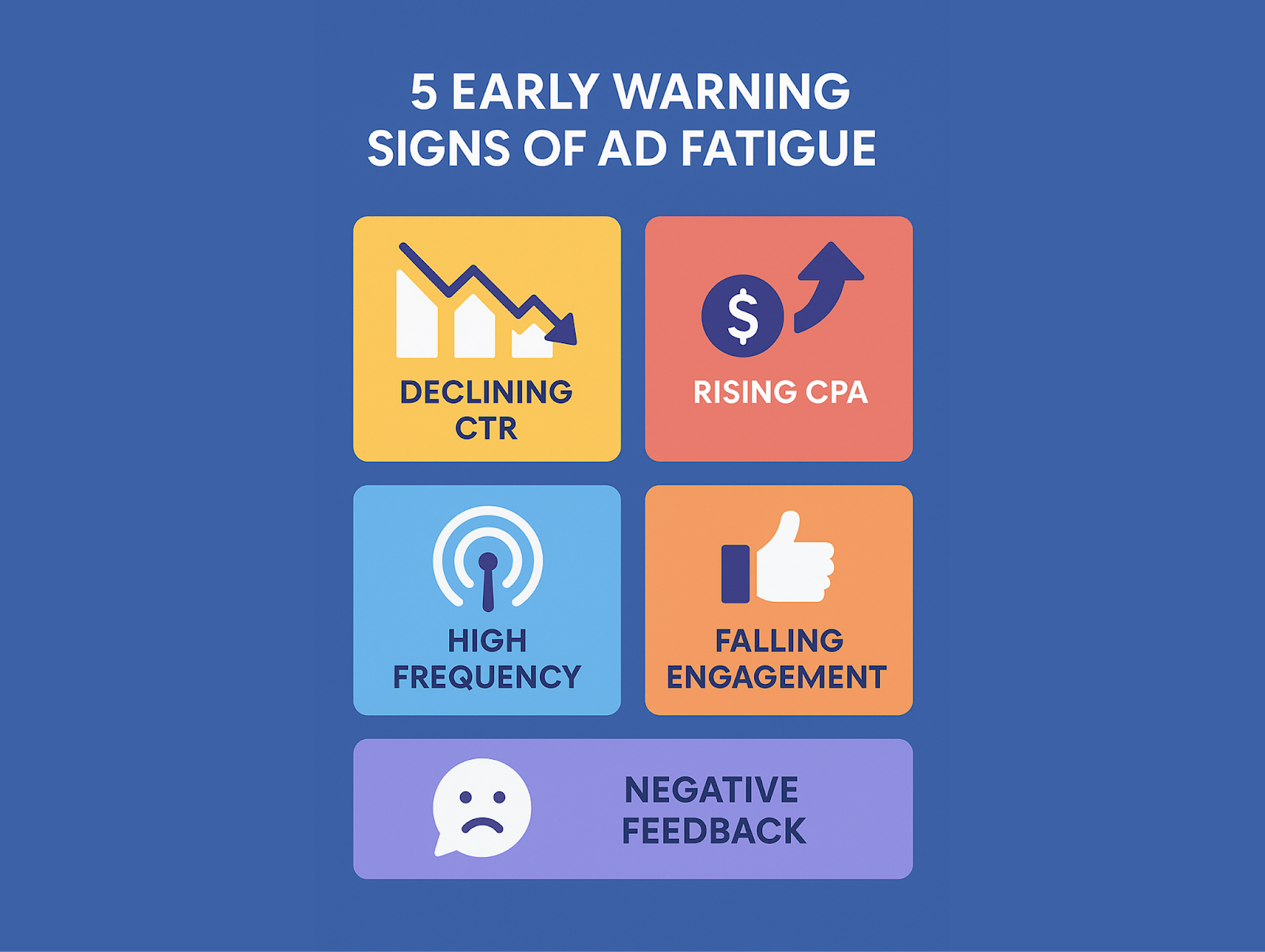
Image Source: LeadEnforce
Agencies must constantly innovate and rotate creatives to maintain target audience interest, which can be challenging when working with multiple offers simultaneously.
5. Reporting Lacks Offer-Level Clarity
As campaigns scale, performance data often becomes aggregated, leaving clients unsure which offers are delivering results. Without granular reporting:
- Agencies cannot identify the most profitable offers.
- Funnel inefficiencies go unnoticed until performance declines.
- Client confidence diminishes, increasing the risk of churn.
Detailed, offer-level reporting is essential for making informed decisions and demonstrating value to clients.
6. Internal Teams Get Overloaded
Managing multi-offer campaigns places significant strain on agency resources:
- Campaign setup and organization take much longer.
- Daily optimization becomes more time-consuming.
- Monitoring and troubleshooting require increased attention.
Agencies often reach a ceiling where growth stalls simply because internal teams are stretched too thin. Scaling successfully requires more than just adding more hands—it requires a structured system that streamlines execution.
How White Label Facebook Ads Help?
A white label approach provides agencies with a proven framework for managing multi-offer campaigns efficiently. By offering structure, automation, and dedicated expertise, Facebook ads services help:
- Reduce operational strain on internal teams.
- Improve campaign performance through better organization and targeting.
- Maintain clear reporting so clients understand which offers deliver results.
- Support creative testing at scale without overwhelming staff.
With the right system in place, agencies can scale multiple offers effectively, maximizing ROI while keeping internal workloads manageable.
White label Facebook ad services turn complex multi-offer campaigns into structured, scalable systems that drive measurable results. By combining advanced targeting, strategic budgeting, and rigorous optimization, agencies can manage multiple offers without sacrificing performance or overloading internal teams. Here’s how these solutions work:
1. Structured Campaign Architecture for Multiple Offers
White label teams build a clear, systematic hierarchy to manage campaigns at scale. This includes:
- Offer-specific ad sets that isolate performance metrics by product or service.
- Funnel-based segmentation, separating top-of-funnel (awareness), middle-of-funnel (consideration), and bottom-of-funnel (conversion) audiences.
- Rules to prevent audience overlap, ensuring campaigns don’t compete internally.
A structured architecture reduces confusion, simplifies optimization, and allows campaigns to scale effectively without wasted budget or effort.

Image Source: Birch
2. Offer Segmentation and Intent-Based Targeting
Targeting becomes more precise when each offer is mapped to the right audience. Facebook ads services typically include:
- Cold audiences to generate awareness for new offers.
- Warm retargeting pools for users who have engaged but not yet converted.
- Existing customers for upsells, cross-sells, or loyalty offers.
- Custom and lookalike audiences built from offer-specific performance data.
By matching offers to audience intent, campaigns reach the right people at the right time, improving efficiency and relevance.
3. Controlled Budget Allocation Across Offers
White label teams manage spend strategically, rather than reactively. Budget decisions are guided by:
- Performance thresholds for each offer and funnel stage.
- Funnel priorities, allocating more spend to areas driving maximum impact.
- Growth objectives, balancing testing new offers with maintaining stable revenue streams.
This ensures agencies can safely experiment with new offers while maintaining reliable campaign performance. Key metrics like offer-level CPA, incremental ROAS, and funnel-specific spend efficiency guide every decision.
4. Creative Systems Built for Multi-Offer Testing
Creative strategy is critical when running multiple offers simultaneously. White label teams implement structured testing through:
- Offer-specific messaging angles to speak directly to each target segment.
- Creative matrices that prevent duplication or audience fatigue across campaigns.
- Scheduled refresh cycles to keep ads fresh and maintain engagement.
This approach reduces fatigue, stabilizes CTR, and supports sustainable campaign performance across all offers.
5. Advanced Tracking and Attribution by Offer
White label Facebook advertising provides precise, data-driven tracking to measure real performance:
- Conversion API integration ensures reliable data collection even with browser restrictions.
- Funnel-level attribution tracks which stage drives conversions.
- Offer-specific conversion tracking identifies the true ROI of each product or service.
Agencies gain clarity on what drives results, improving decision-making and client reporting.
6. Offer-Level Optimization and Scaling Playbooks
Teams use systematic, repeatable processes to manage offers:
- Underperforming campaigns are optimized or paused early.
- High-performing offers are scaled methodically.
- Data-driven decisions replace reactive or emotional adjustments.
This ensures resources are allocated efficiently, and campaigns grow sustainably over time.
7. White Labeled Reporting That Makes Complexity Simple
Custom dashboards break down results in ways clients can easily understand:
- Performance by offer
- Metrics by funnel stage
- Insights by audience type
Clients can see which offers succeed, which need improvement, and where to invest next, strengthening trust and supporting long-term engagement.
8. Reduced Operational Load for Agencies
Outsourcing execution to white label specialists frees internal teams to focus on strategy, growth, and client relationships. Agencies can:
- Concentrate on client positioning and campaign strategy.
- Expand service offerings without adding headcount.
- Confidently take on larger or more complex accounts.
This allows agencies to scale efficiently, maintain high-quality performance, and avoid operational bottlenecks.
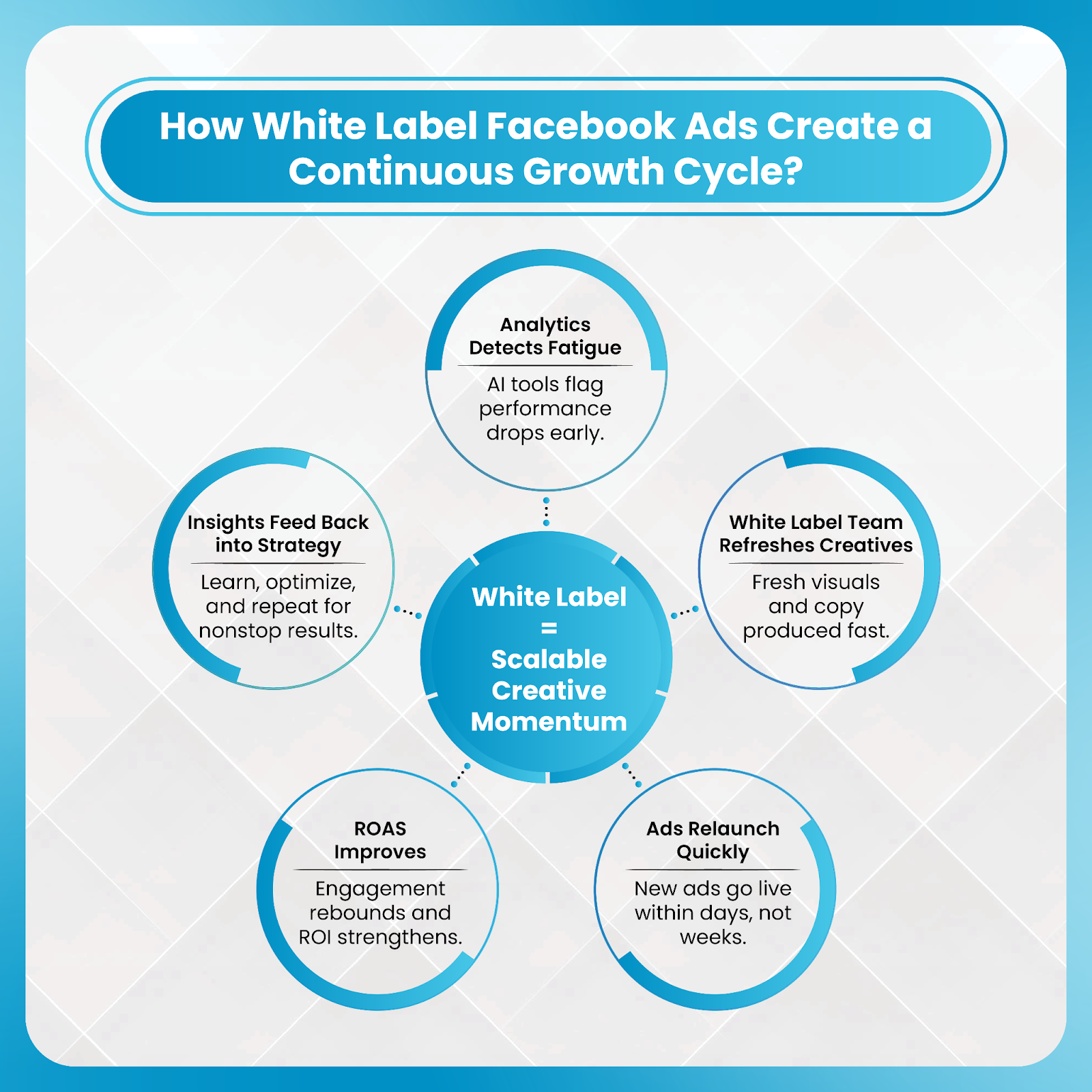
How DashClicks’ White Label Facebook Ads Support Multi-Offer Campaigns?
DashClicks helps agencies manage the complexity of running multiple Facebook ad offers, turning what can be a chaotic process into a streamlined, high-performing system. Their white label Facebook ads are designed to scale campaigns effectively while reducing internal workload. Key features include:
1. Structured Campaign Architecture: DashClicks builds campaigns with clear hierarchies, offer-specific ad sets, and funnel-based segmentation. This structure prevents audience overlap and ensures each offer performs optimally without competing against others.
2. Dedicated Specialists for Setup, Optimization, and Scaling: Experienced teams handle every aspect of campaign management, from initial setup to ongoing optimization. They continuously monitor performance across products, services, and funnels, scaling high-performing offers while pausing or adjusting underperforming ones.
3. Offer-Level Budget Control: Budgets are allocated strategically to prevent cannibalization between offers. This ensures funds are invested where they drive the most ROI and allows agencies to test new offers without risking overall account performance.
4. Creative Testing Frameworks: DashClicks implements structured creative strategies that support multiple offers at once. By testing messaging, visuals, and calls-to-action across different segments, campaigns maintain engagement and minimize fatigue.
5. Advanced Tracking and White Labeled Reporting: Agencies gain transparent, actionable insights with offer-specific tracking and reporting. DashClicks provides dashboards that clearly show which offers drive results, which funnels need attention, and where growth opportunities exist.
By leveraging DashClicks’ expertise, agencies can scale multi-offer Facebook ad accounts efficiently, maintain consistent performance, and focus internal resources on strategy and client relationships rather than execution. Campaigns run more smoothly, results are easier to track, and agencies can confidently take on more complex accounts.
Turning Multi-Offer Complexity Into a Competitive Advantage
As businesses grow, running multiple offers through Facebook advertising is no longer optional—it has become a necessity. However, managing several campaigns simultaneously introduces a level of complexity that can quickly become overwhelming. Without a structured approach, overlapping audiences, inconsistent messaging, and unmonitored budgets can erode campaign performance and frustrate both agencies and clients.
This is where the best white label Facebook ads step in, transforming what could be a challenge into a competitive advantage. By leveraging the systems, tools, and expertise of experienced providers, agencies can manage multiple campaigns efficiently while maintaining high-quality results. Rather than struggling with campaign logistics, teams can focus on strategy, creative optimization, and client growth.
Agencies that master multi-offer execution position themselves to deliver superior outcomes. They can test different offers in parallel, identify top-performing campaigns faster, and optimize budgets dynamically to maximize ROI. This capability not only improves results but also strengthens client relationships, as businesses see consistent, data-driven growth. Moreover, by having reliable systems in place, agencies can scale operations without overburdening their internal teams, avoiding burnout while expanding service offerings.
Partnering with a trusted white label provider like DashClicks allows agencies to shift the heavy lifting to experts while maintaining control over strategy and client communication. With structured campaign architecture, offer-specific targeting, controlled budget allocation, and advanced reporting, agencies gain clarity and confidence in managing multiple offers simultaneously. This integration of technology and expertise ensures campaigns are executed efficiently, performance is optimized, and clients experience measurable success.
Ultimately, the ability to navigate multi-offer campaigns effectively becomes a differentiator. Agencies that embrace white label partnerships and structured execution turn complexity into opportunity, positioning themselves as reliable growth partners while freeing internal teams to focus on higher-level strategic initiatives. In a competitive digital landscape, this approach not only safeguards performance but also drives sustainable agency growth.
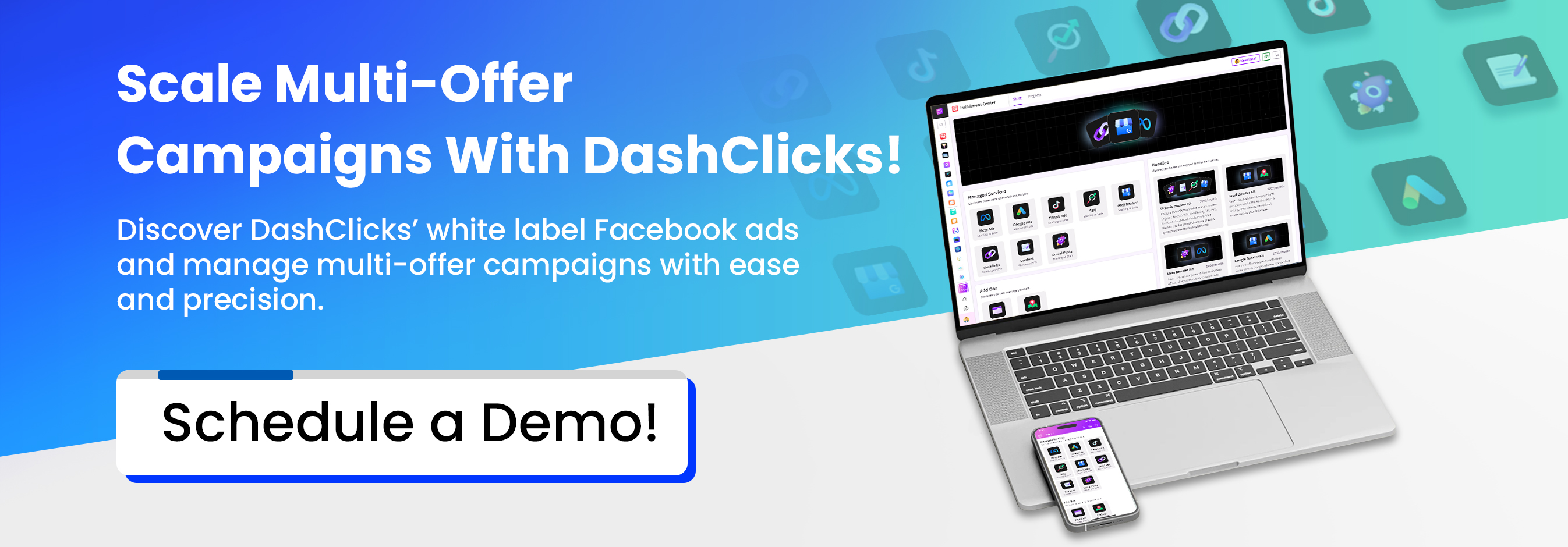

Turning SEO Audits Into Retainers Using White Label SEO
SEO audits are often treated as diagnostic tools. Agencies use them to uncover technical gaps, content issues, and missed optimization opportunities. While this approach is technically sound, it leaves a major opportunity on the table. Too often, audits are delivered as static documents that explain what is wrong but fail to clearly show what comes next.
Industry data supports this challenge. According to surveys from tools like Ahrefs and Semrush, a large percentage of SEO engagements begin with an audit. However, agency benchmark reports consistently show that project-based SEO work generates less predictable revenue than retainers. Retainers provide stability, better forecasting, and stronger client relationships, yet many audits never convert into ongoing work.
The issue is not a lack of expertise. Most agencies deliver thorough and accurate audits. The problem is positioning. Clients often view audits as one-time reports instead of roadmaps tied to growth. Without clear prioritization, revenue impact, and execution planning, clients struggle to see why they should commit to a long-term engagement.
This is where white label SEO shifts the role of audits entirely. Instead of being endpoints, audits become the starting point of a long-term partnership. When audits highlight quick wins, quantify upside, and map out structured execution over months, retainers feel like a logical next step rather than a sales pitch.
Most agencies do not fail because their audits are incorrect. They struggle because their audits do not clearly explain what happens next. White label SEO provides the systems, structure, and scalability needed to turn audits into predictable, ongoing revenue.
Why SEO Audits Fail to Convert Into Retainers?
The problem isn’t audit quality — it’s audit positioning. When audits are framed as one-time evaluations, engagement ends. When they define ongoing risk, control, and accountability, retainers become the logical outcome.
.jpg)
1. Audits Are Too Technical and Not Value-Framed
Many SEO audits are built by experts for experts. They are packed with technical details like crawl errors, broken links, schema warnings, duplicate content, and page speed scores. While these elements are important, they rarely speak the client’s language. Most clients are not asking how many errors their site has. They want to know how SEO issues are affecting visibility, leads, and revenue.
When audits present long lists of problems without context, clients feel overwhelmed instead of informed. The report starts to feel like a technical checklist rather than a business growth plan. Clients see what is broken, but they do not clearly see what they gain by fixing it.
Another common gap is the absence of business-focused metrics. Many audits fail to clearly connect technical fixes to outcomes such as increased traffic, higher conversions, or improved sales performance. Without these links, the audit feels educational rather than strategic.
Key insights that are often missing include:
- Estimated traffic growth from fixing high-impact technical issues
- Revenue at risk due to poor rankings, slow pages, or indexation problems
- Conversion rate improvements tied to UX, mobile performance, and site structure
When audits lack this framing, clients struggle to justify ongoing investment. They may appreciate the analysis, but do not feel confident committing to a retainer because the business upside is unclear.
2. No Clear Separation Between Quick Wins and Long-Term Work
Another major reason audits fail to convert is poor sequencing. Many reports present every issue with equal urgency. From minor metadata tweaks to complex technical rebuilds, everything is grouped together without clear prioritization.
This creates confusion. Clients cannot tell which actions will produce results quickly and which ones require consistent effort over time. As a result, the path forward feels uncertain.
Momentum matters, especially early in an agency-client relationship. When clients cannot see what can realistically be achieved in the first 30 to 60 days, hesitation sets in. They worry that SEO will take too long to show value, even when that is not the case.
Without a clear breakdown between short-term wins and long-term initiatives, agencies miss a critical opportunity to demonstrate early value, build trust, and justify a retainer from the start. Clear differentiation helps clients feel progress is both measurable and achievable.
3. Audits End Without a Structured Execution Plan
Many SEO audits stop at diagnosis. They do a good job explaining what is wrong but fail to outline how the issues should be fixed, in what order, and over what timeframe.
This leaves clients with unanswered questions. Who is responsible for implementation? What should be addressed first? How long will each phase take?
Without timelines, ownership, and sequencing, execution feels vague. Clients are left unsure about scope and expectations, which makes ongoing engagement harder to sell. Agencies may hesitate to propose retainers because the work has not been clearly defined.
A lack of structure turns a valuable audit into an incomplete experience. Clients need clarity on next steps before they are comfortable committing to long-term SEO efforts.
4. Inconsistent Audit Quality Across Clients
In-house audits often depend heavily on who is doing the work. One strategist may focus deeply on technical SEO, while another prioritizes content gaps or backlinks. While both approaches have value, inconsistency creates problems at scale.
When audit depth and structure vary from client to client, it becomes difficult to standardize offerings. Sales teams struggle to explain what clients will receive, and delivery timelines become unpredictable.
This inconsistency also makes retainers harder to productize. If every audit is built from scratch, every retainer feels custom as well. Agencies find it difficult to scale because there is no repeatable system behind the service.
5. Weak Follow-Up and Poor Audit Presentation
How an audit is delivered matters just as much as what it contains. Many audits are shared as PDFs or spreadsheets with minimal explanation. After delivery, communication often slows or stops entirely.
Without a clear narrative, clients do not know how to interpret the findings. There is no story that connects issues, priorities, and outcomes. As a result, the audit is treated as a reference document rather than a proposal for growth.
When audits lack strategic presentation, clients may appreciate the information but fail to see it as the foundation for ongoing work.
6. Agencies Lack Time to Turn Audits Into Sales Assets
Even when audits uncover significant opportunities, agencies often lack the time to reframe those insights into sales-ready narratives. Strategists move quickly to the next audit or campaign, leaving little room for follow-up conversations that position retainers effectively.
This creates a missed opportunity. Audits already contain the value agencies need to sell ongoing services. Without a structured system to translate insights into execution plans, that value never fully materializes.
The core issue is not the audit itself. It is the absence of a clear, repeatable process that turns insight into action. This gap is exactly where white label SEO changes the model by providing structure, consistency, and execution clarity.
How White Label SEO Turns Audits Into Retainers?
SEO audits by white label SEO are structured with long-term engagement in mind. Instead of acting as technical checklists, they are designed to support ongoing strategy and execution. The focus shifts from identifying problems to prioritizing impact, business outcomes, and realistic implementation.
Rather than presenting a flat list of issues, these audits organize findings into clear, actionable categories that help clients understand progression over time:
- Immediate wins that can be addressed quickly and show early results
- Mid-term improvements that build consistency and momentum
- Long-term growth initiatives are tied to scalability and competitive positioning
This layered structure helps clients see SEO as a process, not a one-time fix. They gain clarity on what matters now, what comes next, and how each phase supports long-term performance. When improvements are framed as a journey instead of a repair list, retainers feel like a natural extension of the audit.

1. Clear Quick Wins That Prove Value Early
Early results play a major role in client confidence. Audits by White label SEO services are designed to surface fixes that can deliver measurable impact within the first 30 to 45 days. These quick wins demonstrate progress and reinforce the value of ongoing work.
Common early opportunities include:
- Indexation cleanup and crawl optimization
- Internal linking improvements that strengthen page authority
- Core Web Vitals and page speed enhancements
Google research consistently shows that faster-loading websites experience lower bounce rates, which directly influences engagement and conversions. Improvements in performance and accessibility often lead to visible gains faster than clients expect.
To support this momentum, audits highlight clear metrics such as:
- Time to visible impact
- Site health score improvements
- Early traffic stabilization or recovery
When clients see progress early, retainers become easier to justify. Trust builds faster, and long-term execution feels worthwhile.
2. Long-Term SEO Roadmaps That Naturally Extend Engagement
Strong audits do not stop at quick fixes. They include structured execution plans that typically span six to twelve months. These roadmaps provide a clear view of how SEO efforts compound over time.
Most long-term plans cover areas such as:
- Technical SEO enhancements to support site stability
- Content development and optimization for sustained visibility
- Authority building through structured link strategies
When clients review and approve an SEO roadmap during the audit phase, the retainer becomes the execution of a plan they already understand and agree with. This removes friction from the sales process and shifts the conversation from whether to invest to how soon work can begin.
3. Quantifying Opportunity and Risk
White label SEO also helps agencies translate findings into meaningful forecasts. Instead of presenting issues in isolation, teams estimate both upside and risk to frame SEO as a strategic investment.
This often includes:
- Potential traffic gains from ranking improvements
- Revenue loss tied to unresolved technical or content issues
- Competitive gaps in authority or topical coverage
By quantifying opportunity and risk, agencies position retainers as proactive and preventative. Ongoing SEO becomes a way to protect current performance while unlocking future growth, rather than an optional marketing expense.
4. Audit Insights Translated Into Client-Ready Narratives
One of the most valuable aspects of white label SEO services is interpretation. Complex technical findings are translated into clear, plain-language explanations that resonate with decision-makers.
Client-ready deliverables often include:
- Executive summaries focused on outcomes, not errors
- Prioritized action plans that clarify next steps
- Visual breakdowns that show impact and progress
This approach allows agencies to lead with strategy instead of diagnostics. Clients understand why actions matter, which builds confidence and supports long-term engagement.
5. Repeatable, Scalable Audit-to-Retainer Playbooks
Consistency is critical for growth. White label SEO introduces standardized audit templates that ensure every client receives the same depth and structure.
This repeatability enables agencies to:
- Deliver audits faster without sacrificing quality
- Upsell retainers more easily with predictable scope
- Set clear client SEO expectations across all engagements
With a reliable framework in place, agencies can scale confidently while maintaining consistent results.
6. Reporting That Reinforces Ongoing Value
Monthly reporting plays a key role in retention. Reports tie progress directly back to the original audit, showing how identified issues are being resolved over time.
Reports commonly track:
- Issues resolved versus issues identified
- Organic traffic growth trends
- Ranking improvements for priority keyword clusters
- Overall technical health progression
This continuity reminds clients why the retainer exists and reinforces the value of continued investment month after month.
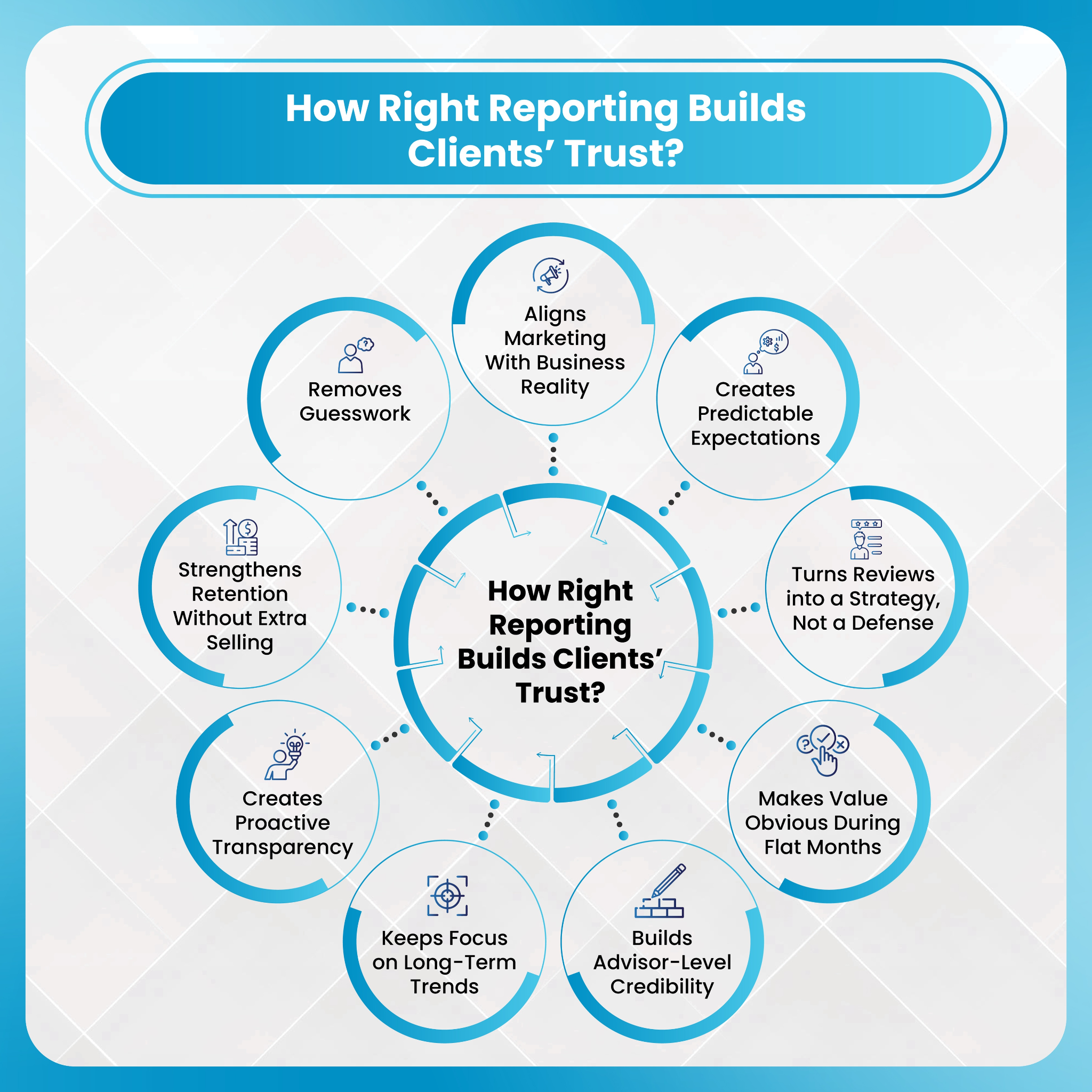
7. Allowing Agencies to Focus on Strategy and Client Trust
When execution and analysis are handled by a white label SEO agency, internal teams gain valuable time and focus. Agencies can shift attention away from technical production and toward higher-level responsibilities.
This allows teams to spend more time on:
- Client communication and education
- Strategic positioning and planning
- Retention and expansion opportunities
As a result, audits evolve from isolated deliverables into the foundation of long-term partnerships. Instead of closing a project, agencies open the door to sustained collaboration and predictable growth.
How DashClicks’ White Label SEO Services Turn Audits Into Retainers?
DashClicks plays a key role in helping agencies transform SEO audits into ongoing retainers through its structured and scalable approach. The platform offers white label SEO services designed specifically for agency growth and client retention.
Their platform provides retention-focused audits that go beyond technical checklists. Each audit highlights quick wins alongside long-term opportunities, giving clients a clear sense of progress and direction. Issues are prioritized based on business impact, helping agencies clearly explain why certain fixes matter more than others.
Execution-ready roadmaps are a core strength. Their platform delivers SEO plans that naturally extend audits into monthly retainers, removing ambiguity around scope and timelines. Ongoing optimization aligns closely with initial audit findings, which helps maintain continuity and trust.
All deliverables are white-labeled, allowing agencies to present insights and results as their own. This reinforces credibility while saving time and resources. With consistent reporting tied back to the original audit, agencies can clearly show progress and reinforce the value of ongoing engagement.
By handling execution and reporting, DashClicks enables agencies to focus on strategy, relationships, and growth while turning one-time audits into predictable recurring revenue.
From One-Time Audits to Predictable Retainers
SEO audits already contain the insights agencies need to sell retainers. The difference lies in how those insights are structured, prioritized, and executed.
White label SEO transforms audits into living roadmaps that guide long-term growth. Agencies that systemize their audit-to-retainer workflows see stronger retention, more predictable revenue, and higher client trust.
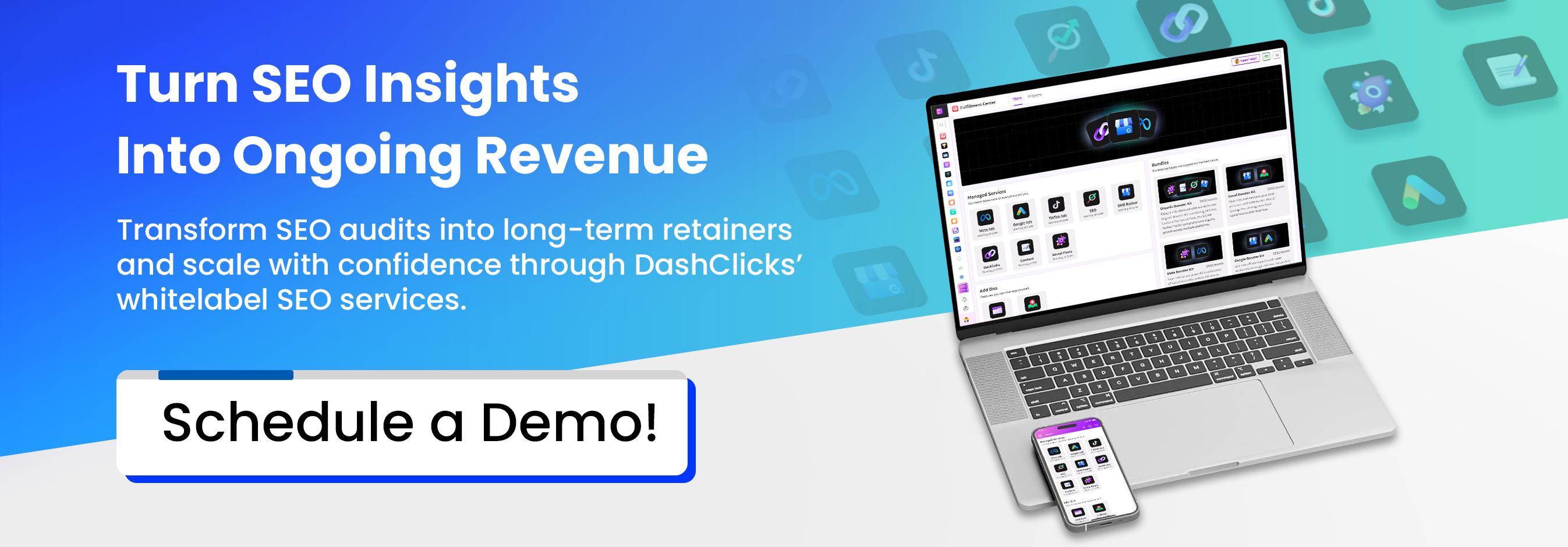

Scaling Seasonal Campaigns with White Label PPC Without Sacrificing Quality
Seasonal PPC campaigns are some of the most profitable opportunities for brands and agencies, but they are also the most demanding. From Q4 holiday shopping and Black Friday to Back-to-School, Christmas, and New Year sales, these short windows bring sharp spikes in search demand, intense competition, and fast-moving budgets.
During peak seasons, search volume can double or even triple in certain industries. Google data shows that retail-related searches often start climbing weeks earlier than expected, catching many advertisers off guard. When this happens, agencies face a familiar problem. Clients want quick results, higher conversions, and flawless execution, but internal teams are already stretched thin.
For agencies, the challenge is not knowing that seasonal campaigns matter. It is figuring out how to scale quickly without cutting corners or burning out staff. This is where white label PPC becomes a strategic advantage rather than a short-term fix.
This blog is for agencies that want to handle seasonal demand with confidence. It explains why seasonal PPC campaigns often fail, how white label PPC services help agencies scale without sacrificing quality, and how experienced providers execute high-volume campaigns behind the scenes. It also takes a closer look at how DashClicks supports agencies during peak seasons while protecting brand trust and performance.
The Seasonal PPC Challenge: Why So Many Campaigns Fail
Seasonal campaigns are different from everyday PPC efforts. They move faster, cost more, and leave less room for error.
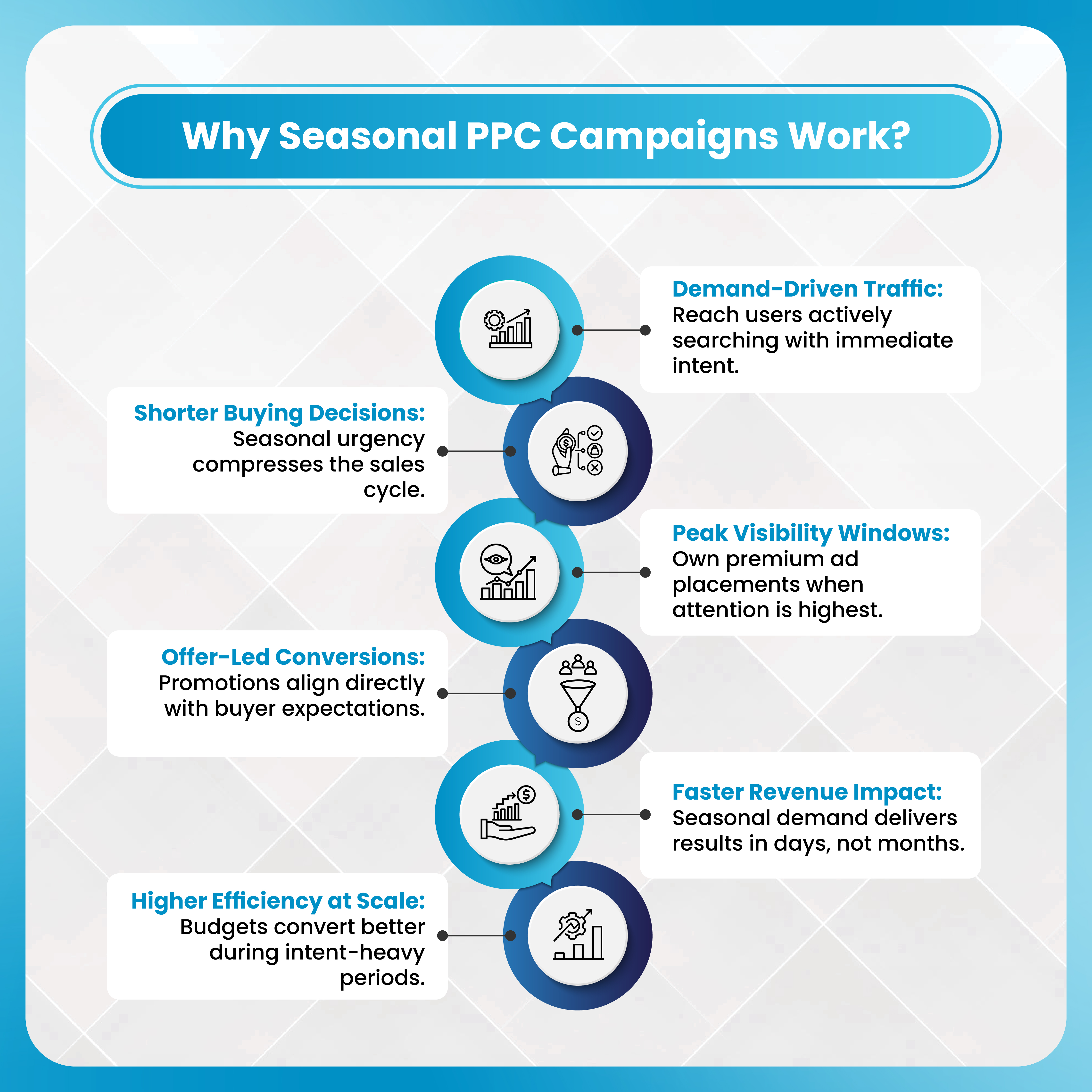
Yet many agencies approach them with the same processes they use year-round. This mismatch is one of the main reasons seasonal performance falls short.
1. Unrealistic Expectations vs. Resource Reality
Seasonal campaigns often come with aggressive goals. Clients expect exponential growth in traffic and conversions, sometimes with limited budgets or very short lead times. At the same time, internal teams are juggling multiple accounts that all need attention at once.
During major seasons like Black Friday or Q4, auction dynamics change quickly. Cost per click rises as more advertisers enter the market, and ad visibility becomes harder to maintain. Google has reported that holiday-related searches in recent years began rising as early as September, yet many advertisers still wait until October to adjust bids and budgets. Industry benchmark studies show that more than 60% of advertisers make bid changes after demand has already surged, which puts them at an immediate disadvantage.
Without enough hands on deck, teams struggle to keep up with these shifts. This gap between expectations and available resources creates rushed decisions and missed opportunities.
2. Poor Preparation and Timing
One of the most common mistakes in seasonal PPC is waiting too long to prepare. Many campaigns rely on last-minute changes instead of structured planning.
Typical preparation gaps include:
- Limited use of historical seasonal data
- No budget ramp-up strategy
- Delayed bid adjustments
- Minimal creative testing before peak demand
When optimization starts only after the season begins, performance often suffers. A common example is adjusting return on ad spend bidding during the week of Black Friday. By then, algorithms are already under pressure, and learning phases can disrupt delivery when it matters most.
Data from PPC industry surveys shows that campaigns planned at least four weeks in advance tend to achieve higher impression share and more stable cost per acquisition during peak periods.
3. Inadequate Scaling Framework
Scaling a seasonal campaign is not as simple as increasing budgets. Without proper controls, higher spend can quickly lead to wasted impressions and rising costs.
Effective scaling requires:
- Pre-tested creatives ready for rotation
- Predictive bidding strategies
- Audience expansion with safeguards
- Continuous negative keyword refinement
According to a 2024 industry PPC survey, 76% of professionals reported that scaling too fast without a structured framework increased CPA by 30 to 40%. This kind of spike can erase seasonal gains in just days.
4. Team Overload and Burnout
Seasonal demand multiplies daily tasks. Teams must manage ad creation, reporting, optimization, and client communication, often across dozens of accounts at once.
When teams are overloaded, quality suffers. Optimization becomes reactive instead of proactive, and quality assurance steps are skipped. One agency case study shared in a digital marketing forum noted an 18% increase in CPC during peak season due to delayed bid adjustments caused by limited staffing.
Burnout also affects long-term performance. Teams that push too hard during seasonal peaks often struggle to recover afterward, which impacts client retention.
5. Technology Gaps
Many agencies still rely on manual reporting or outdated dashboards. During seasonal spikes, this slows down response time.
Key challenges include:
- No automated alerts for performance anomalies
- Limited pacing and budget monitoring
- Delayed data updates during high traffic periods
Recent surveys indicate that more than half of PPC teams feel limited by a lack of automation tools during peak campaigns. When data lags behind reality, decisions are always one step late.
When these challenges repeat season after season, it becomes clear that the issue is not a lack of effort. It is a structural limitation. Solving seasonal PPC failures requires a scalable execution model, not more pressure on internal teams.
White Label PPC for Scaling Without Compromising Quality
White Label PPC is often misunderstood as simple outsourcing. In reality, it is a strategic way to expand capacity while maintaining control, consistency, and quality during high-demand periods.
What White Label PPC Really Is?
At its core, white label PPC involves partnering with a specialized provider that manages PPC execution on behalf of an agency. The agency retains full branding, client relationships, and strategic oversight.
The provider focuses on:
- Campaign setup and management
- Ongoing optimization
- Reporting and quality assurance
This structure allows agencies to deliver high-level service without adding internal headcount.
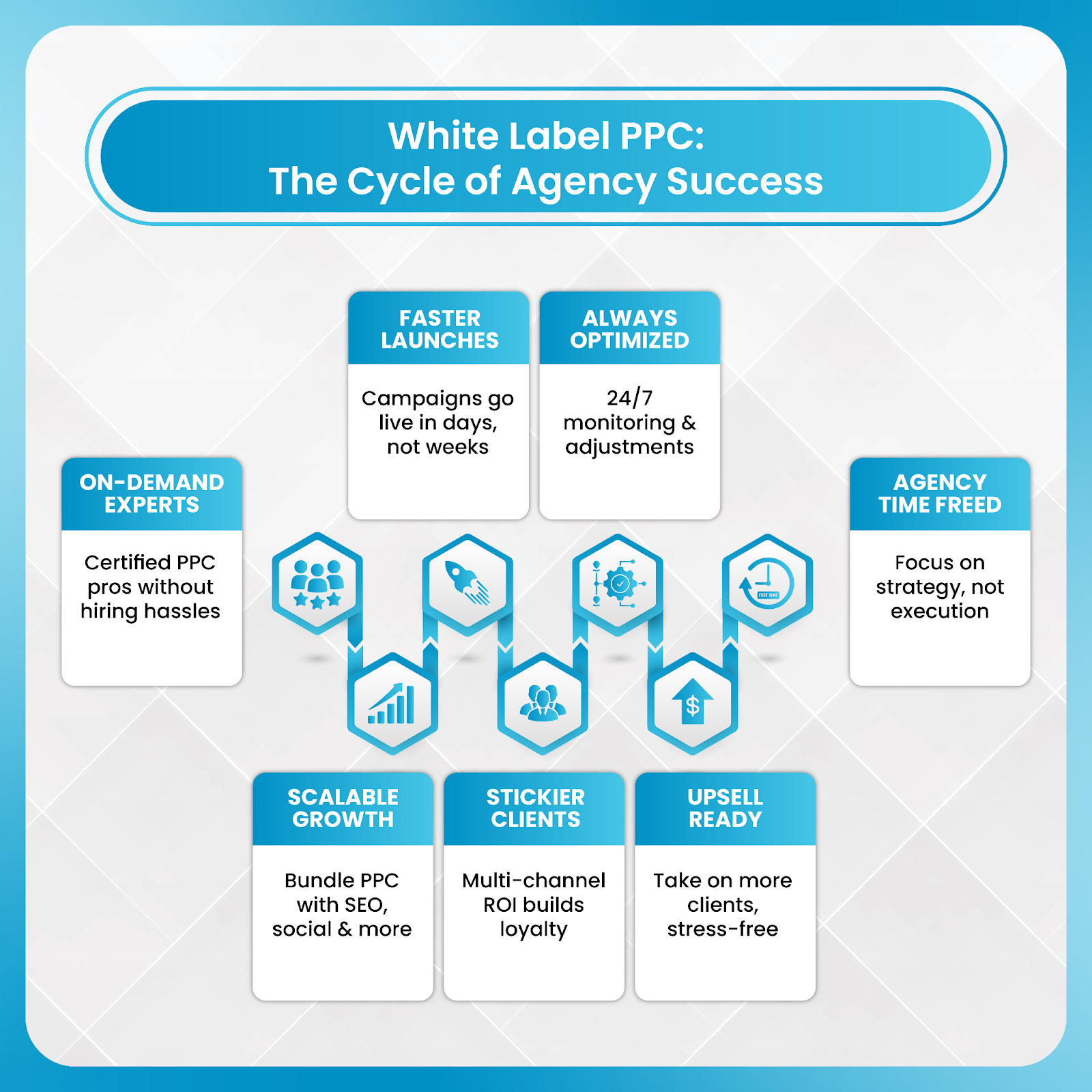
Core Benefits White Label Brings During Seasonality
1. Dedicated Expertise on Demand
Seasonal PPC requires specialists who understand bidding volatility, audience behavior shifts, and platform-specific nuances. White label partners focus exclusively on PPC, which gives agencies access to deep expertise exactly when they need it.
In one shared industry example, an agency using white label support adjusted holiday bids dynamically across multiple accounts. The result was a 26% reduction in CPA and a 48% increase in conversions compared to the previous season.
2. Rapid Scalability Without Overhead
Hiring temporary staff for seasonal demand is costly and time-consuming. Training alone can take weeks, which defeats the purpose of fast scaling.
With white label PPC services, agencies can scale up or down based on campaign volume. Industry data shows that agencies using white label support are able to handle two to three times more seasonal clients without increasing internal headcount.
3. Structured Seasonal Playbooks and Pre-Planning
Experienced white label partners bring proven seasonal frameworks. These often include:
- Pre-built campaign templates
- Auction and competitor insights
- Creative testing schedules
- Budget pacing models
Agencies that launch campaigns earlier using structured playbooks often see higher impression share and smoother performance during peak weeks.
4. Round-the-Clock Optimization and Support
Seasonal performance can change within hours. Bid landscapes shift, budgets deplete faster, and conversion rates fluctuate.
White label teams often combine automated alerts with manual checks by experienced specialists. Industry benchmarks suggest that most seasonal performance loss is due to delayed reactions. White label teams typically respond within 12 hours, compared to an industry average of nearly 48 hours.
5. Better Quality Assurance and Reporting
During high-volume periods, human error becomes more likely. White label teams reduce this risk through dedicated QA processes.
These include:
- Pre-flight ad checks
- Naming and testing standards
- Tracking and conversion validation
Studies show that error rates can be three times higher when teams are overloaded. Focused QA helps maintain consistency and trust.
6. Transparent SLAs and Predictable Delivery
Clear service-level agreements define turnaround times, optimization cadence, and reporting schedules. This predictability helps agencies stay in control and manage client expectations during peak seasons.
The real value of white label ppc lies in how it transforms seasonal execution from a reactive scramble into a structured, repeatable process.
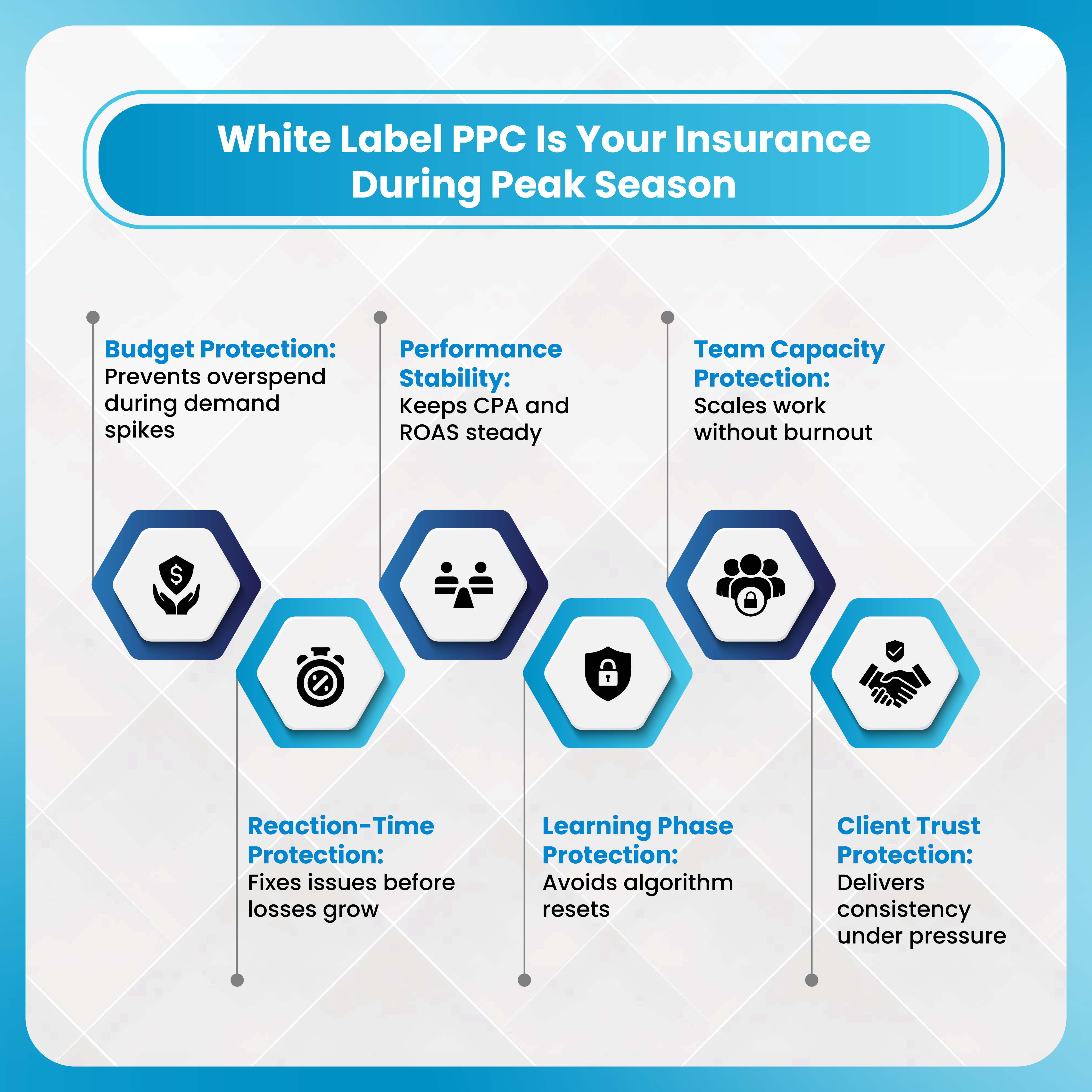
How White Label PPC Providers Execute Seasonal Campaigns Smoothly?
Understanding how white label PPC works behind the scenes helps agencies clearly see why it performs so well during high-pressure seasonal peaks. The strength of this model lies in preparation, structure, and disciplined execution long before traffic begins to surge.
1. Pre-Season Planning and Forecasting
Successful seasonal campaigns start weeks, not days, before the peak. White label PPC teams begin by reviewing historical performance data from previous seasons, year-over-year trends, and month-over-month changes. Auction insights are analyzed to understand how competitors behaved during similar periods, including how aggressively they increased bids and budgets. Keyword demand trends are also mapped early to identify when search interest typically starts rising, which often happens earlier than expected.
Based on this data, budget pacing models are built in advance. These models help determine how much to spend daily and weekly as demand increases, rather than reacting after budgets are already strained. High-intent keywords are identified early, allowing teams to prioritize terms most likely to convert when competition intensifies. This level of preparation minimizes rushed changes during peak weeks and gives agencies greater confidence in every decision.
2. Campaign Architecture Built for Scale
Seasonal traffic surges can quickly expose weaknesses in account structure. White label PPC providers design campaigns specifically to handle volume increases without losing efficiency. Seasonal campaigns are separated from evergreen efforts to prevent performance overlap and budget conflicts. Ad groups are built with a granular structure, which allows faster adjustments to bids, creatives, and targeting when conditions change.
Match types are expanded carefully instead of all at once, ensuring reach grows without sacrificing relevance. Negative keyword layers are also applied early to control wasted spend. When demand spikes, this clean structure helps campaigns remain stable and responsive rather than chaotic.
3. Creative and Asset Readiness
Creative preparation is another major advantage of white label PPC execution. Seasonal ad copy is written, reviewed, and approved well before peak demand hits. Instead of scrambling to create promotions at the last minute, teams prepare multiple variations in advance. This allows testing to happen early, so only the strongest messages are scaled when traffic increases.
Promotional extensions, countdown messaging, and season-specific offers are also configured ahead of time. Industry data consistently shows that ads aligned with seasonal intent perform better. Campaigns using timely, relevant messaging often see click-through rates increase by 15 to 25% compared to generic ads during peak periods.
4. Controlled Budget and Bid Scaling
Scaling spend during seasonal peaks requires discipline. White label PPC providers avoid sudden budget jumps that can disrupt performance. Instead, budgets are increased incrementally with daily and weekly caps in place. This protects campaigns from overspending while platforms adjust to higher volume.
Smart bidding strategies are closely monitored to ensure they do not reset learning phases at the worst possible time. Manual overrides are applied during volatile auction periods when automated systems need extra guidance. This controlled approach helps keep cost per acquisition stable even as overall spend grows significantly.
5. Real-Time Monitoring and Rapid Optimization
Seasonal campaigns can change direction within hours. White label PPC teams assign dedicated specialists to monitor performance multiple times throughout the day. Automated alerts flag unusual changes such as sudden CPC increases, drops in conversions, or budgets running out earlier than expected.
When issues are detected, adjustments are made quickly. Data shows that campaigns optimized within 12 hours of a performance dip recover far faster than those left untouched for two days or more. Rapid response prevents small issues from turning into costly problems.
6. Quality Assurance Under High Volume
High traffic increases the risk of human error, which is why quality assurance becomes even more critical during seasonal peaks. White label teams rely on pre-flight checklists before major launches or changes. Secondary reviews ensure bids, budgets, and targeting are correct before updates go live.
Conversion tracking is regularly validated, and landing pages are checked for consistency with ad messaging. This extra layer of oversight reduces costly mistakes and protects the overall user experience when volumes are at their highest.
7. Post-Season Analysis and Knowledge Retention
Once the season ends, the work does not stop. White label PPC providers conduct detailed performance audits to understand what worked and what did not. Insights are gathered on top-performing audiences, creative fatigue points, budget efficiency, and conversion trends.
These findings are documented and used to refine the next seasonal playbook. As a result, each new season starts with better data, stronger strategies, and fewer unknowns. Over time, campaigns become more efficient, more predictable, and more profitable for agencies and their clients.
White Label PPC in Action: How DashClicks Supports High-Performance Seasonal Campaigns?
DashClicks plays a key role in helping agencies scale seasonal PPC campaigns without increasing internal headcount. As a trusted white label ppc agency, their team provides certified PPC specialists with hands-on experience managing high-volume seasonal campaigns across industries.
The platform supports agencies throughout the entire seasonal cycle. This includes pre-season planning, scalable campaign setup, and account structures designed to handle traffic spikes without performance loss. During peak demand, the team delivers real-time optimization, continuous monitoring, and strict quality assurance to reduce errors and protect ROI.
One of the most valuable aspects is fully white-labeled reporting. Agencies maintain full ownership of client relationships while delivering professional, transparent insights. This allows agencies to focus on strategy and growth, while DashClicks handles execution with precision.
By combining expertise, structure, and scalability, DashClicks enables agencies to approach seasonal campaigns with confidence instead of stress.
Conclusion
Seasonal PPC campaigns fail not because of a lack of opportunity, but because of limited preparation, capacity, and expertise. As competition intensifies and search behavior shifts earlier each year, agencies need a smarter way to scale.
White label ppc offers a proven solution. It allows agencies to expand execution capacity, maintain quality standards, and respond faster to performance changes without overloading internal teams. With structured planning, real-time optimization, and dedicated specialists, seasonal campaigns become predictable and profitable rather than chaotic.
Agencies that evaluate their current bottlenecks before the next peak season put themselves in a stronger position to win. The right white label ppc services can turn seasonal pressure into a growth advantage.
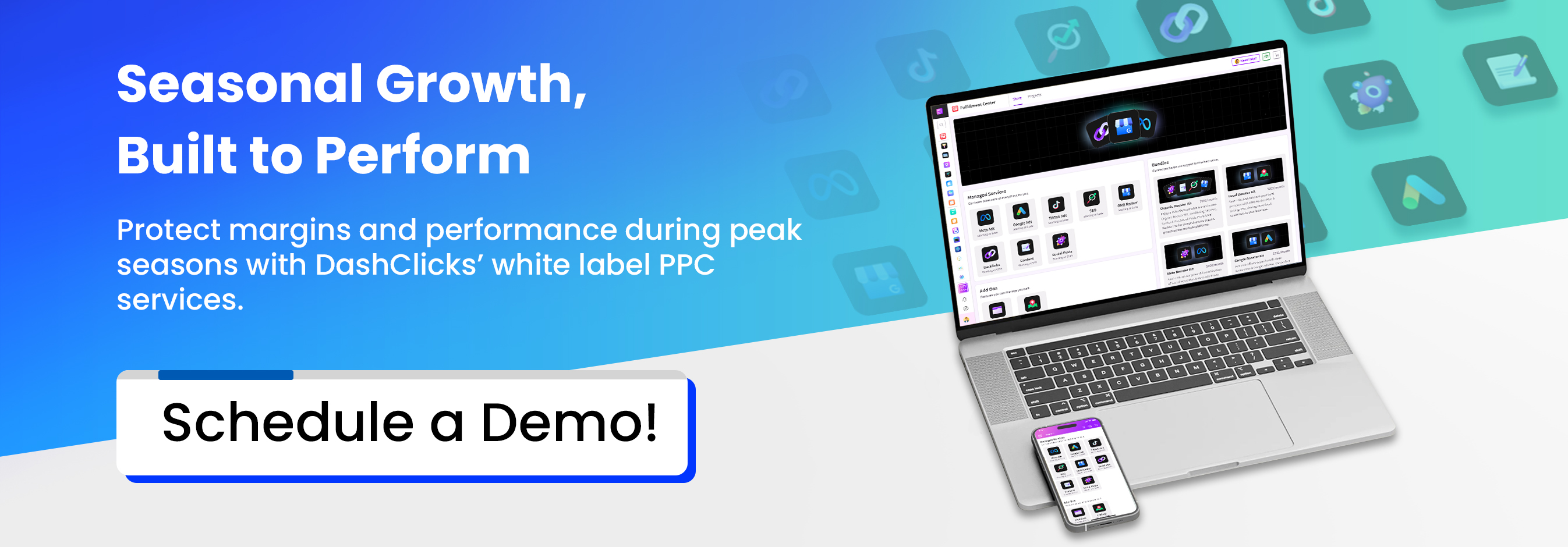

White Label SEO as a Risk-Reduction Strategy for Growing Agencies
Rapid agency growth is exciting. New clients, expanding service lines, and stronger revenue signals all point to success. Yet growth without a clear risk management strategy often leads to operational strain, rising costs, and unhappy clients. Many agencies discover this the hard way when SEO demand increases faster than their internal capacity.
Search engine optimization is no longer a single-discipline service. It now includes technical audits, content planning, link building, analytics, conversion tracking, and ongoing optimization tied to frequent algorithm changes. When agencies try to scale SEO too quickly without the right structure, cracks begin to show. Missed deadlines, inconsistent results, and unclear reporting can all damage client trust.
White label SEO services offer a practical way to reduce these risks. In simple terms, white label SEO involves outsourcing SEO fulfillment to a specialized partner while delivering the work under your agency’s brand. While some agencies view this as a shortcut, the reality is much deeper. White label SEO is a strategic risk-reduction tool that helps agencies grow without stretching internal teams or exposing themselves to unpredictable costs.
According to Google, its search algorithm changes hundreds of times each year, with several major core updates annually. Keeping up with this pace requires dedicated expertise and constant monitoring. For growing agencies, building and maintaining that level of specialization internally can be costly and risky.
This blog explores how white label SEO reduces operational, financial, and client retention risks for scaling agencies. You will see the common challenges agencies face as they grow SEO services, how white label SEO addresses those challenges, and why platforms like DashClicks play a key role in turning SEO into a stable, scalable offering rather than a liability.
The Risks Agencies Face While Scaling SEO Services
A. Operational Risk: Execution Breakdowns
Operational risk is often the first pressure point agencies feel when SEO services grow faster than internal infrastructure. Demand increases quickly, but processes, staffing models, and quality controls tend to lag.
1. Overextension of Internal Teams
One of the most common challenges is team overextension. As agencies onboard more SEO clients, existing staff are expected to manage multiple responsibilities at once. Strategy development, keyword research, technical audits, content alignment, link building, and reporting all compete for attention. When one person is responsible for too many moving parts, execution quality suffers. Small technical issues get missed, content recommendations are rushed, and optimization work becomes reactive rather than strategic.
2. Quality Inconsistency Across Accounts
Quality inconsistency becomes a natural byproduct of this strain. Without clearly defined roles or dedicated specialists, SEO outcomes vary widely between accounts. One client may benefit from strong technical fixes and steady content improvements, while another receives minimal attention beyond basic reporting. Over time, this uneven performance creates internal stress and external risk. Clients compare results, notice gaps, and begin to question the agency’s overall capability. The primary reason a client leaves an agency is often due to quality issues.

3. Failure to Keep Up with SEO Complexity
SEO complexity adds another layer of exposure. Search algorithms evolve constantly, and core updates can reshape ranking factors with little warning. Moz reports that Google releases major algorithm updates several times each year, often with meaningful ranking impacts. Agencies without dedicated SEO specialists may struggle to monitor early signals, test adjustments, or pivot strategies quickly. When rankings drop unexpectedly, the agency is left reacting under pressure rather than leading with confidence.
Example: A common growth scenario illustrates this risk clearly. An agency doubles its SEO client base within a year but adds only one additional generalist to the team. Deliverables begin slipping past deadlines. Technical audits take weeks instead of days. Proactive optimization is replaced with surface-level fixes. Clients start noticing slower response times and fewer strategic insights, which leads to frustration and increased churn risk.
B. Financial Risk: Costly Scaling and Overhead
Scaling SEO in-house comes with significant financial commitments that are often underestimated.
1. High Costs of Hiring and Training SEO Talent
Hiring experienced SEO professionals requires competitive salaries, benefits, and long onboarding cycles. According to Glassdoor data, mid-level SEO specialists in the United States typically earn between $60,000 and $80,000 per year, before factoring in benefits, payroll taxes, and bonuses.
Training represents another ongoing cost. SEO is not a static discipline. Tools change, best practices evolve, and algorithm updates require continuous learning. Agencies must invest in courses, certifications, conferences, and internal knowledge sharing just to maintain baseline expertise. Recruitment and onboarding can take months, slowing down service expansion and delaying revenue realization.
2. Burned Margins Due to Fixed Overhead
Fixed overhead compounds the risk. Salaries, software subscriptions, and reporting tools remain constant regardless of client volume. During seasonal slowdowns or client attrition, agencies still carry the same expenses. This puts pressure on margins and reduces financial flexibility. Leadership may become cautious about taking on new initiatives, testing new services, or investing in innovation.
3. Inefficient Allocation of Resources
When teams are split between SEO strategy and hands-on execution, resource efficiency often suffers. High-cost specialists may spend time on routine tasks rather than high-impact strategy, limiting return on investment.
This inefficiency becomes especially visible when workflow fluctuates. Agencies may hire expensive technical SEO talent only to experience inconsistent demand, leaving specialized resources underutilized while still on payroll.
Deloitte reports that talent shortages and rising hiring costs are among the top growth inhibitors for mid-sized agencies. When revenue growth does not keep pace with expanding overhead, profitability erodes. Agencies may find themselves working harder for slimmer margins, which increases stress at both the leadership and team levels.
C. Client Retention Risk: Inconsistent Results and Reporting
Client retention becomes fragile when SEO performance feels unpredictable or poorly explained. Even when work is being done, a lack of consistency, clarity, or proactive communication can quickly erode trust and increase churn risk.
1. Performance Volatility During Algorithm Shifts
Algorithm updates often introduce short-term volatility, but clients experience them as sudden ranking drops or stalled growth. When agencies are slow to adjust—or struggle to explain what’s happening—confidence declines.
Without proactive monitoring and strategic response, agencies are forced into defensive conversations. Instead of leading with insight, they react after performance dips occur. Over time, repeated volatility without clear explanations makes SEO feel risky rather than reliable.
2. Poor Communication and Unclear ROI
Clients expect more than traffic charts and keyword rankings. They want clear performance reporting tied to business impact—leads, conversions, and revenue.
Agencies without specialized SEO reporting frameworks often rely on generic dashboards or surface-level metrics. This creates misalignment. Clients see activity but not value, which leads them to question whether SEO is worth the investment. Even strong execution can be undermined by weak communication.
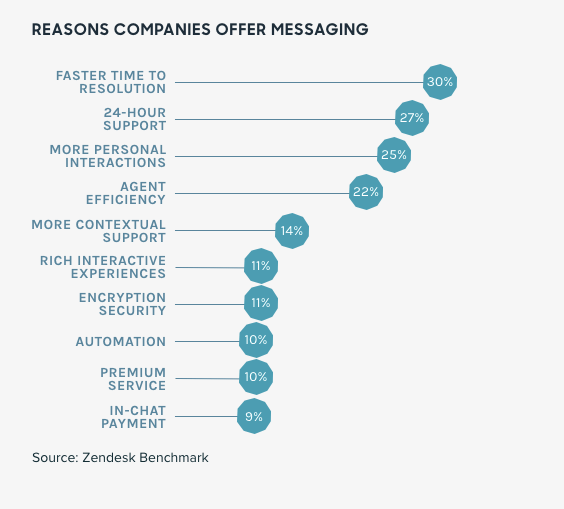
Image Source: Zendesk
3. Churn Risk from Failed Expectations
Inconsistent performance and unclear reporting directly increase churn. When progress feels slow or unpredictable, clients begin comparing providers and exploring alternatives.
HubSpot reports that consistent, transparent reporting can increase client retention by approximately 25–30%. When agencies fail to set clear expectations and demonstrate ongoing value, SEO becomes an easy line item to cut—especially under budget pressure.
Example: Confidence Breakdown
A client sees gradual ranking improvements but limited explanation of timelines or next steps. Months pass without a clear ROI context. The client questions the investment, grows frustrated with vague reporting, and ultimately moves to a competitor offering clearer deliverables and measurable outcomes.
How White Label SEO Reduces Risk?
A. Mitigating Operational Risk
1. Access to Specialized SEO Expertise
White label SEO allows agencies to reduce execution risk by gaining immediate access to specialized expertise. Rather than relying on generalists to manage every aspect of SEO, agencies work with teams structured around defined roles. These teams typically include technical SEO specialists, content strategists, link building experts, and analysts. Clear role ownership improves accuracy, accountability, and overall execution quality.
2. Faster Turnaround & Scalability
Speed is another major advantage. White label providers are designed to operate at scale, which allows agencies to onboard new SEO clients quickly without waiting through lengthy hiring and training cycles. This responsiveness prevents internal bottlenecks during growth phases and ensures new accounts receive proper attention from day one.
3. Standardized Processes & Quality Assurance
Standardized processes further reduce operational strain. Established white label partners follow proven workflows that guide each engagement from onboarding through ongoing optimization. These workflows are refined through experience across many accounts and industries, which reduces trial and error. Built-in quality assurance systems help ensure that work is delivered consistently across all clients, regardless of volume.
A typical white label SEO workflow often includes:
- Client onboarding and goal alignment
- Comprehensive technical and content audits
- Strategy development and approval
- Ongoing execution and optimization
- Regular reporting and performance reviews
This structured approach creates predictability. Teams know what happens next, deliverables are easier to manage, and fewer issues fall through the cracks. The result is smoother execution and lower operational risk.
B. Reducing Financial Risk
1. Shift from Fixed to Variable Costs
One of the most compelling financial benefits of white label SEO is the shift from fixed to variable costs. Instead of carrying full-time salaries and long-term overhead, agencies pay for fulfillment based on active client demand. This model aligns expenses more closely with revenue and helps protect profit margins as the business grows.
2. Economies of Scale
White label providers also operate with economies of scale. Because they support multiple agencies, they can invest in advanced SEO tools, data platforms, and research resources that would be cost-prohibitive for many individual firms. Agencies gain access to this infrastructure without absorbing the full licensing or maintenance costs.
3. Budget Flexibility
Financial flexibility improves as well. Agencies can scale services up or down as client needs change, which reduces exposure during slower periods or market uncertainty. This adaptability allows leadership to focus on growth and innovation rather than cost containment.
For example, an agency that previously hired a full-time technical SEO specialist can replace that fixed salary with white label support. This lowers overhead while expanding service capacity, enabling the agency to serve more clients without increasing internal headcount.
C. Protecting Client Retention and Reducing Churn
1. Consistent, Data-Driven Results
Client retention depends heavily on consistent performance and clear communication. White label SEO supports both by providing data-driven execution and ongoing optimization that helps stabilize results during algorithm changes.
Rather than reacting after rankings drop, white label teams continuously monitor performance signals and adjust strategies proactively. This reduces volatility and helps maintain steady progress, even when search environments shift.
2. Strategic Reporting Frameworks
Reporting also becomes more effective. White label SEO frameworks emphasize meaningful metrics such as organic traffic growth, conversion performance, and lead quality. Brandable dashboards allow agencies to present results in a clear, professional format that aligns SEO activity with business outcomes.
3. Client Communication Support
Communication tools further strengthen client relationships. Many white label providers offer structured reporting templates, performance summaries, and action plans that help agencies maintain consistent, proactive contact with clients. These tools make it easier to explain results, set expectations, and outline next steps.
Agencies that implement structured reporting and proactive optimization often experience stronger client confidence and longer retention cycles. While results vary, many see noticeable reductions in churn after integrating white label SEO into their service model.
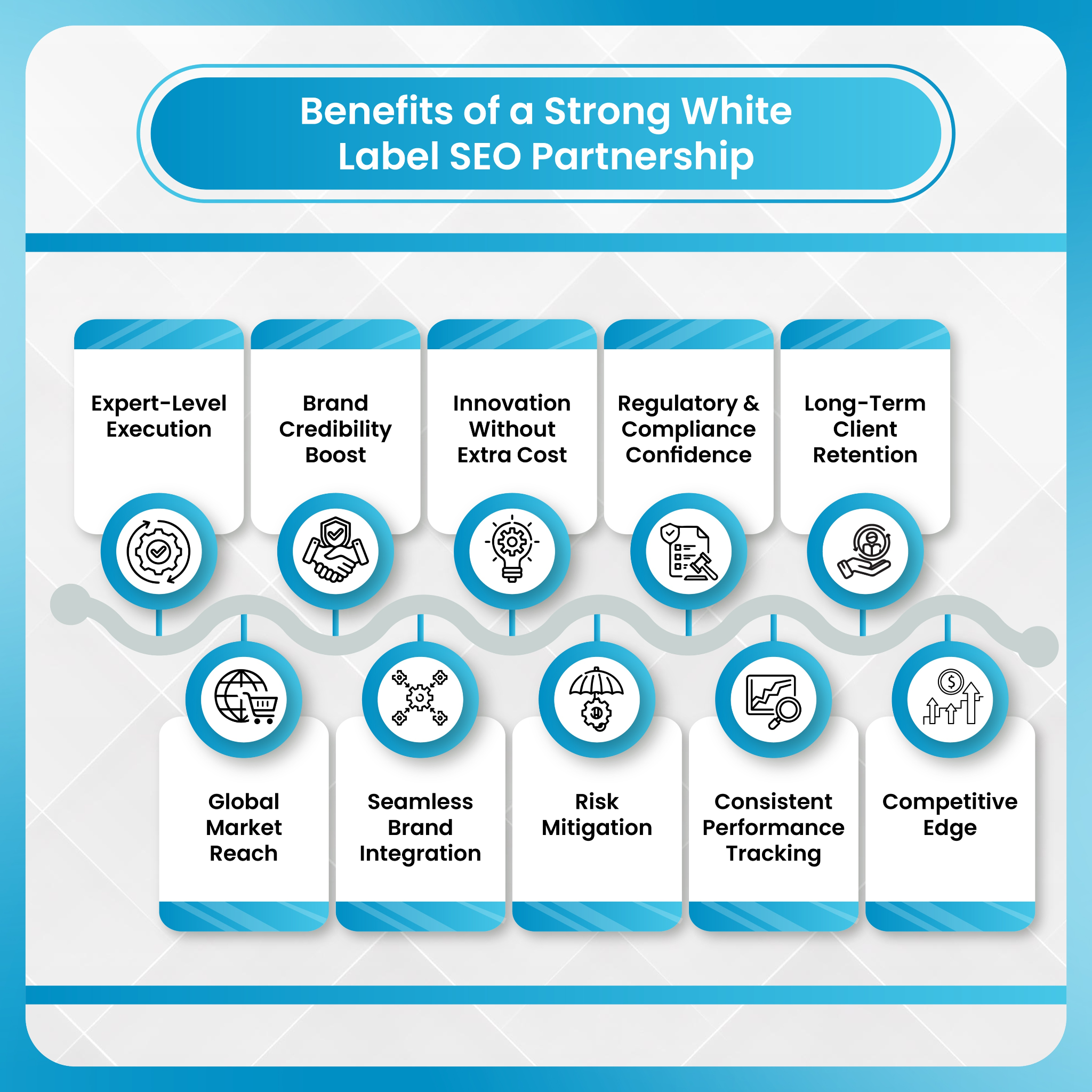
DashClicks’ White Label SEO as a Risk-Reduction Engine
DashClicks plays a key role in helping agencies manage growth without taking on unnecessary risk. Its white label SEO services are designed to support agencies at every stage of scaling.
From an operational standpoint, their team provides end-to-end SEO fulfillment supported by proven systems. These systems adapt to algorithm changes and evolving best practices, which helps agencies maintain stability even as search landscapes shift.
Financially, the platform eliminates the need for hiring and expensive software investments. Agencies avoid long-term overhead while gaining access to experienced SEO teams and advanced tools. Costs remain predictable and scalable, making financial planning easier.
Client confidence improves through white-labeled reporting and proactive optimization. Agencies can present clear performance insights under their own brand, which strengthens trust and supports long-term relationships.
Most importantly, DashClicks enables scalable growth. Its plug-and-play infrastructure allows agencies to expand SEO services quickly without internal strain. This makes white label SEO not just a fulfillment option, but a strategic risk-management solution for growing agencies.
Conclusion and Next Steps
Agency growth without proper risk management often leads to execution gaps, financial pressure, and client churn. SEO, with its complexity and constant change, magnifies these challenges.
White label SEO directly addresses these risks by providing specialized expertise, structured workflows, flexible costs, and retention-focused reporting. It allows agencies to grow confidently without sacrificing quality or stability.
Rather than viewing white label SEO as outsourced labor, agencies should see it as a strategic layer that protects their business while supporting expansion. When implemented correctly, it transforms SEO from a potential liability into a predictable, scalable service.
Agencies considering this approach should evaluate partners based on experience, transparency, reporting quality, and scalability. Starting with a pilot engagement and clear success benchmarks can help ensure alignment.
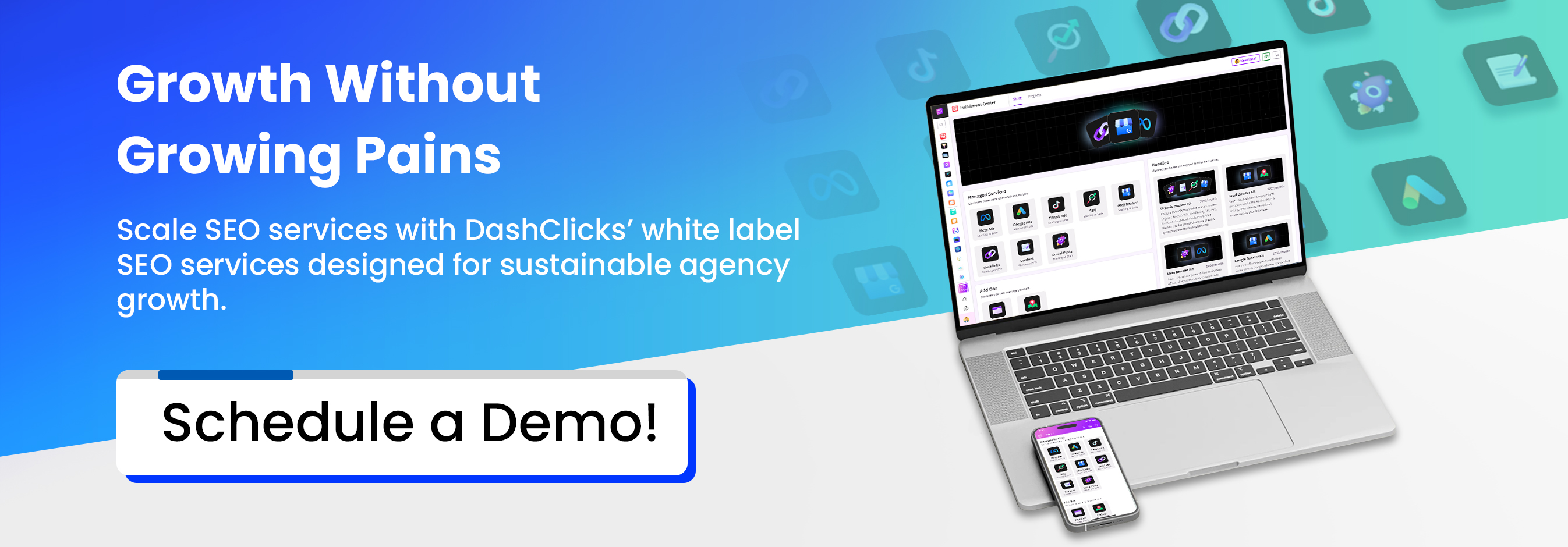

How Agencies Use White Label Facebook Ads to Expand Upsell Opportunities
Paid social advertising has become one of the strongest growth levers for businesses across industries. Facebook, now part of Meta, continues to dominate the paid social space because of its massive user base and advanced targeting capabilities. Meta has reported that 9 out of 10 small and medium-sized businesses see value from Facebook ads, which explains why clients increasingly expect this channel to be part of their marketing mix.
For digital agencies, this demand creates both opportunity and pressure. Clients no longer want isolated services like SEO or content alone. They expect strategies that connect traffic, engagement, and conversions across multiple platforms. When Facebook advertising is missing from the offering, agencies often struggle to position themselves as full growth partners.
This is where white label Facebook Ads come into play. Instead of building an in-house paid social team from scratch, agencies partner with specialized providers who deliver Facebook ad services under the agency’s brand. This model allows agencies to expand their service portfolio, introduce high-value upsells, and improve client results without increasing operational strain.
Upselling is not about pushing extra services. It is about identifying gaps in a client’s growth strategy and filling them with solutions that deliver measurable impact. White label Facebook Ads help agencies do exactly that. They provide a reliable way to offer paid social campaigns that align with existing services like SEO, PPC, or email marketing.
In this blog, we will explore why agencies often struggle to upsell Facebook Ads, how white label Facebook Ads services remove those barriers, and how this approach unlocks sustainable revenue growth. We will also look closely at how DashClicks supports agencies in using white label Facebook Ads to expand upsell opportunities while maintaining quality, trust, and profitability.
Why Do Agencies Struggle to Upsell Facebook Ads?
For many digital agencies, Facebook advertising sounds like a natural next step. Clients ask for it, competitors offer it, and the platform itself promises strong reach and measurable results. Yet in practice, upselling Facebook Ads is far more difficult than it appears. The challenge often starts inside the agency.
A. Internal Team Limitations
Most agencies build their core services around SEO, content marketing, web design, or organic social. These offerings rely on long-term strategy, steady optimization, and predictable workflows. Paid social advertising works differently. It demands fast decision-making, frequent testing, and a deep understanding of platform-specific mechanics. Without the right internal setup, agencies hesitate to introduce Facebook Ads as an upsell.
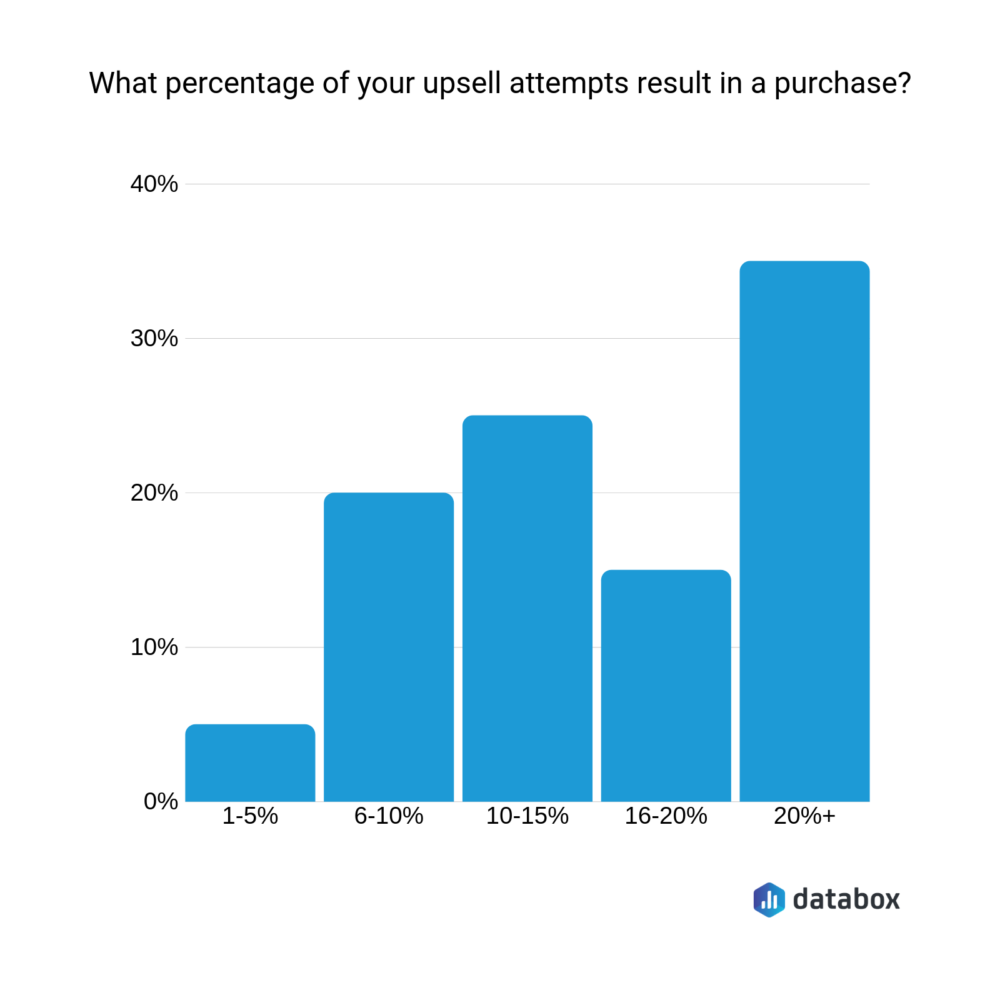
Image Source: Databox
1. Lack of Specialist Expertise
Facebook advertising goes far beyond launching a few ads and selecting a target audience. It requires ongoing creative testing, detailed audience segmentation, smart bid strategies, funnel planning, and constant optimization based on performance data. On top of that, the platform changes often. New ad formats, evolving automation features, privacy updates, and tools like the Conversions API all require regular attention.
According to Social Media Examiner, 63% of marketers say keeping up with changes in paid social platforms is a major challenge. For agencies without dedicated Facebook Ads specialists, this creates a steep learning curve. The fear of making costly mistakes or delivering inconsistent results often stops agencies from confidently pitching Facebook Ads to existing clients.
2. Hiring Challenges
Even when agencies recognize the need for expertise, hiring is not always a practical solution. Skilled Facebook ad specialists are in high demand and come with high price tags. Competitive salaries, benefits, and onboarding time can quickly stretch budgets.
For small to mid-sized agencies, hiring full-time talent for a service that is still being tested as an upsell feels like a big gamble. If client demand does not scale as expected, the agency is left carrying overhead without guaranteed returns. This financial risk pushes many agencies to delay or avoid offering Facebook Ads altogether.
3. Limited Bandwidth
Agencies that already have capable marketing teams often run into another issue: time. Team members are usually managing multiple responsibilities, from SEO and PPC to email campaigns, reporting, and client communication. Adding Facebook Ads into the mix means splitting focus even further.
Paid social requires close monitoring and frequent adjustments. When it becomes just another task on an already full plate, performance can suffer. This dilution impacts not only Facebook Ads but also the agency’s existing services. To avoid this, many agencies choose not to upsell Facebook Ads, even when clients show interest.
Together, these internal limitations create a real barrier. Without the right expertise, resources, and capacity, upselling Facebook Ads feels risky. As a result, agencies miss out on revenue opportunities and struggle to position themselves as full-service growth partners.
B. Client Trust and Upsell Barriers
Even when agencies see the value in Facebook Ads, the real resistance often comes from the client side. Upselling paid social requires a high level of trust, and many clients approach Facebook advertising with skepticism shaped by past experiences.
1. Fear of Underperformance
A large number of businesses have already experimented with Facebook Ads, often with mixed or disappointing results. Some saw high spend with little return, while others were left tracking likes and engagement that never translated into sales. These experiences create hesitation.
From the agency’s point of view, this fear cuts both ways. Clients are wary of investing again, and agencies are cautious about recommending a service if they are not fully confident in the outcomes. No agency wants to risk damaging a strong client relationship by introducing a channel that might not perform as expected.
2. Lack of Proof
When it comes to increasing budgets or adding new services, clients want evidence. Case studies, performance benchmarks, and realistic ROI projections are often non-negotiable. Without a clear history of success in Facebook advertising, agencies struggle to make a convincing case.
This lack of proof makes upselling difficult. Even if an agency understands the potential of Facebook Ads, clients are unlikely to commit without seeing examples of measurable impact. As a result, upsell conversations stall before they gain momentum.
3. ROI Confusion
Facebook Ads produce a wide range of metrics, from impressions and reach to clicks, leads, and purchases. For many clients, this data feels overwhelming. According to eMarketer, 60% of marketers find it challenging to accurately measure paid social ROI, especially when connecting ad performance to real revenue outcomes.
When agencies cannot clearly explain how Facebook Ads contribute to business goals like cost per acquisition or return on ad spend, confidence drops. Upsells rely on clarity, and without a clear link between ad activity and results, clients hesitate to invest more.
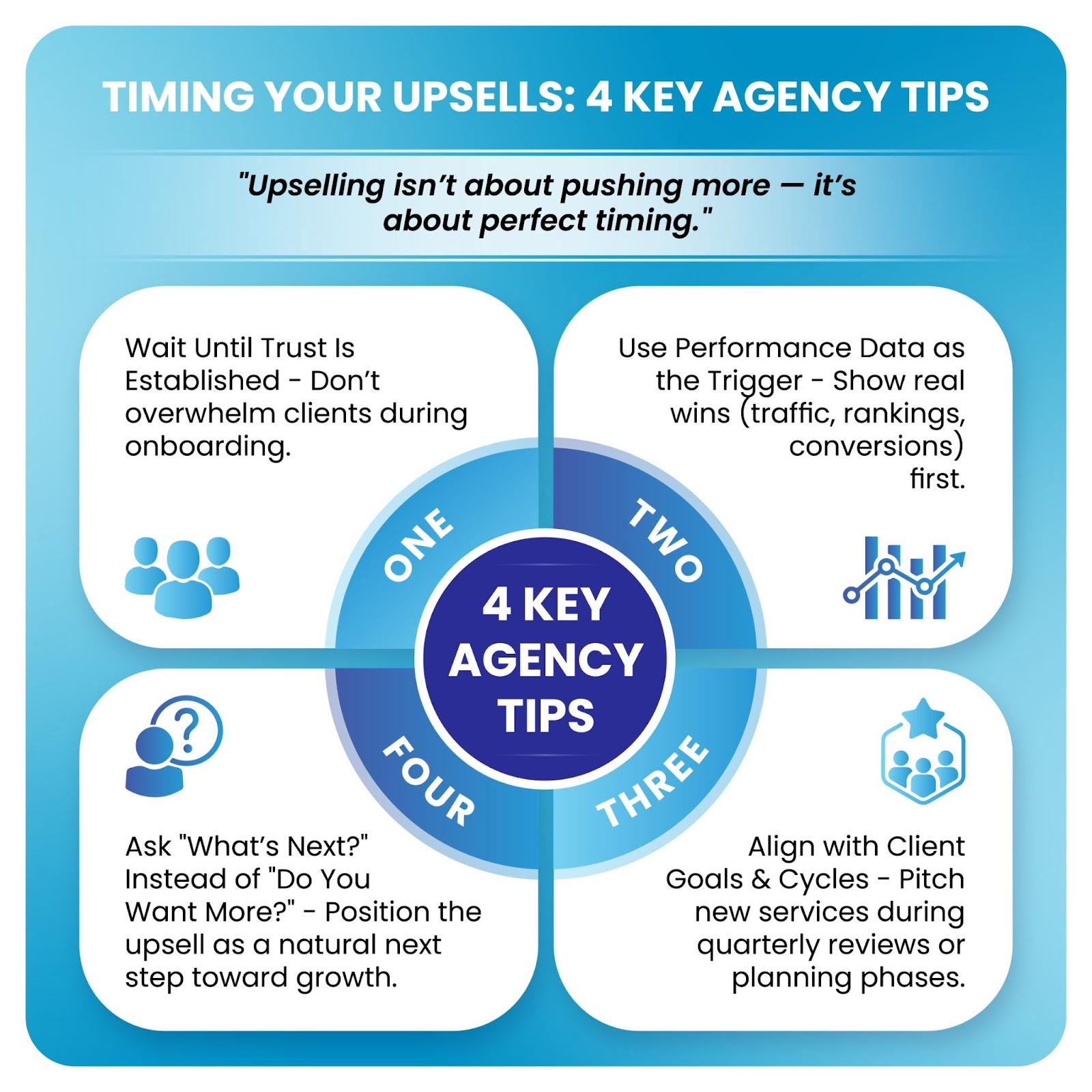
C. Operational and Scalability Challenges
Beyond trust and perception, operational issues often prevent agencies from moving forward with Facebook Ads.
1. Inconsistent Execution
Without standardized strategies and processes, campaign results can vary widely across clients. One account may perform well, while another struggles, even with similar budgets and goals. This inconsistency makes upselling techniques risky, as agencies cannot reliably predict outcomes or set clear expectations.
2. Manual Processes
Managing Facebook Ads involves many moving parts. Campaign setup, creative testing, audience research, optimization, and reporting all take time. When these tasks are handled manually, delivery slows down. Scaling paid social media across multiple clients becomes difficult, and internal teams feel the strain.
3. Technology Gaps
High-performing Facebook campaigns often rely on advanced tools for tracking, automation, and analytics. These tools help improve efficiency and accuracy but can be expensive and complex to manage in-house. Without them, campaigns may fail to reach their full potential, reinforcing agency hesitation around offering Facebook Ads as an upsell.
Together, these client trust and operational barriers make Facebook Ads feel like a high-risk addition. Until agencies solve these challenges, upselling paid social remains a difficult step rather than a natural progression.
How White Label Facebook Ads Services Empower Upsell Growth?
1. The Core Value of White Label Facebook Ads
White label Facebook Ads services address the exact challenges that hold agencies back.
- Access to Expert Execution: White label partners employ specialists who focus exclusively on Facebook advertising. They stay current with platform updates, testing strategies, and optimization techniques. This expertise reduces performance risk and gives agencies confidence when introducing paid social as an upsell.
- Your Brand Stays Front and Center: All services are delivered under the agency’s name. Clients see the agency as the strategist and partner, while the white label team handles execution behind the scenes. This protects client relationships and strengthens trust.
- Faster Launches: Without the need to hire or train staff, agencies can launch Facebook ad campaigns quickly. This speed allows them to respond to client demand and capitalize on upsell opportunities in real time.
2. Turning Performance Into Upsell Momentum
Strong results make upselling easier.
- Revenue-Focused Metrics: White label Facebook Ads prioritize business KPIs such as ROAS, CPA, and lifetime value. When agencies can show how ads drive sales or qualified leads, upsell discussions become data-driven rather than speculative.
- Cross-Channel Synergy: Facebook Ads work especially well when combined with other services. Agencies can retarget website visitors from SEO campaigns or nurture leads generated through PPC. This integrated approach improves conversion rates and strengthens the overall marketing strategy.
- Improved Retention: According to Nielsen, combining Facebook ads with other advertising channels can boost brand recall by up to 70%. When clients see consistent growth across channels, they are more likely to stay long-term and invest in expanded services.
3. Scalability Through Proven Processes
White label partners bring structure and efficiency.
- Repeatable Frameworks: Pre-built campaign structures, audience templates, and testing cycles lead to more predictable results. Agencies can confidently upsell knowing there is a proven system in place.
- Efficient Workflows: Automation tools, shared dashboards, and standardized reporting reduce manual work. This efficiency allows agencies to manage more accounts without sacrificing quality.
- Access to Advanced Tools: Many best white label Facebook Ads services include tools for bid optimization, creative analysis, and tracking that would be expensive to maintain internally. Agencies benefit from enterprise-level capabilities without the overhead.
4. Reporting That Supports Upsells
Clear reporting builds trust and drives expansion.
- White-Labeled Dashboards: Reports are fully branded and focused on business impact. Clients see how Facebook Ads contribute to revenue, leads, and growth goals.
- Story-Driven Insights: Instead of listing clicks and impressions, agencies can explain how campaigns move prospects through the funnel. This narrative approach makes it easier to propose budget increases or additional services.
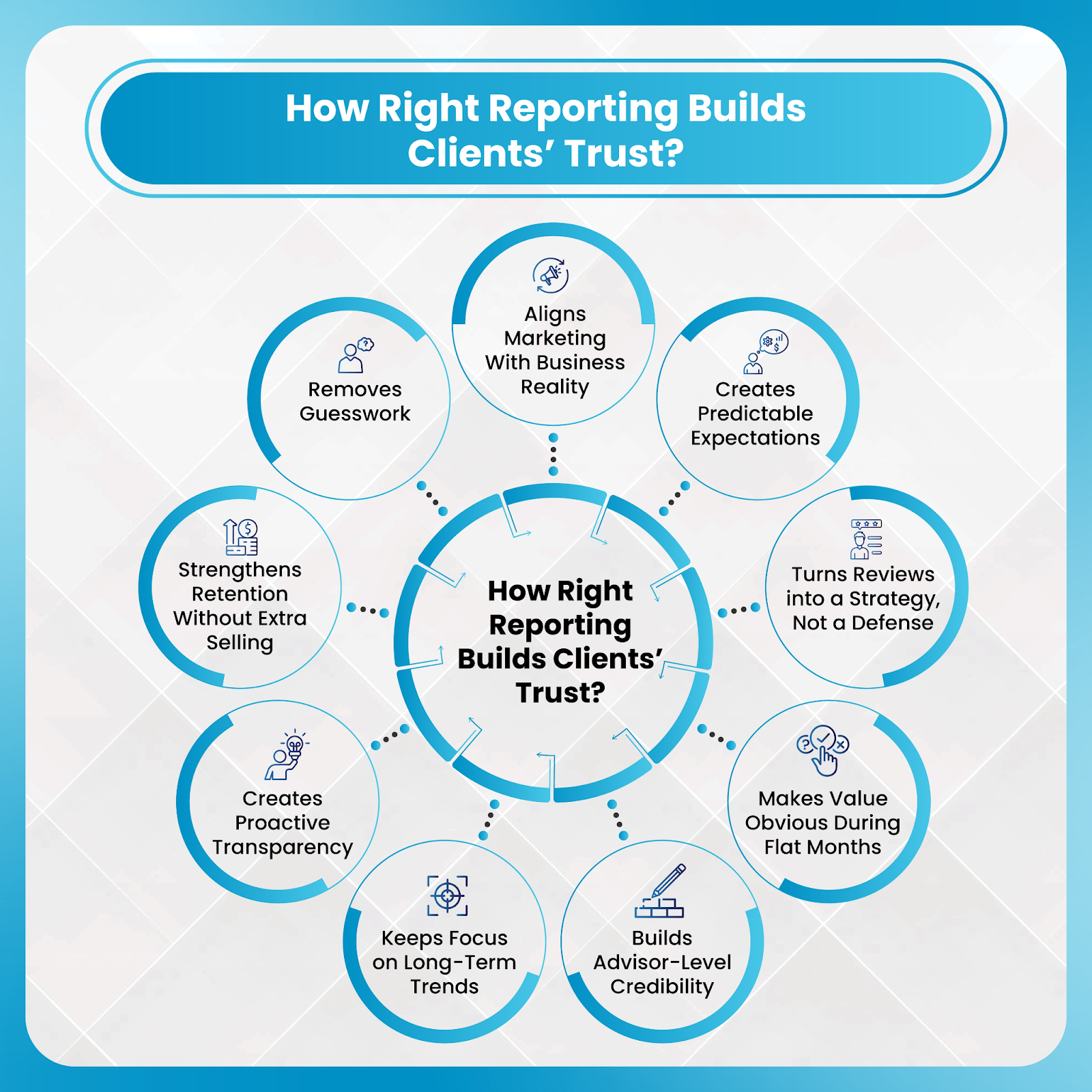
5. Pricing Models That Encourage Growth
White label Facebook Ads fit naturally into upsell-friendly pricing structures.
A. Tiered Packages
- Entry-level paid social campaigns
- Growth-focused optimization and scaling
- Full-funnel strategies with retargeting and CRO
B. Add-on Services
- Conversion tracking setup
- Creative and video production
- Audience research and segmentation
C. Ongoing Retainers
- Monthly performance reviews
- Strategic planning sessions
- Cross-channel alignment
These options allow agencies to expand revenue while delivering clear value.
How DashClicks Helps Agencies Expand Upsell Opportunities With White Label Facebook Ads?
DashClicks plays a key role in helping agencies confidently offer and scale white label Facebook Ads as a high-value upsell. Their approach focuses on execution quality, scalability, and brand protection, which are critical for long-term agency growth.
DashClicks provides dedicated Facebook ad specialists who manage strategy, campaign setup, creative testing, and ongoing optimization under the agency’s brand. This allows agencies to offer Facebook advertising without hiring in-house or worrying about inconsistent results. Campaign frameworks are designed for lead generation, ecommerce, and retargeting, making it easier to match Facebook Ads with existing client goals.
Advanced tracking is another major advantage. DashClicks supports proper pixel implementation, Conversions API setup, and continuous performance testing. This ensures agencies can clearly connect ad spend to real outcomes, which strengthens upsell conversations and builds client confidence.
Equally important is scalability. DashClicks’ white label fulfillment model allows agencies to grow paid social offerings across multiple clients while maintaining healthy margins. With white-labeled reporting and streamlined workflows, agencies spend less time on execution and more time on strategy and client relationships.
Conclusion
Upselling Facebook Ads is no longer optional for agencies that want to remain competitive. Clients expect integrated strategies that drive measurable results, and paid social plays a critical role in that ecosystem. Yet many agencies struggle to upsell Facebook Ads due to skill gaps, operational challenges, and concerns around performance and ROI.
White label Facebook Ads solve these problems by providing expert execution, scalable processes, and reliable reporting under the agency’s brand. They turn Facebook advertising from a risky add-on into a predictable growth engine. With stronger performance metrics, clearer narratives, and proven frameworks, agencies can confidently expand client relationships and increase lifetime value.
For agencies looking to grow without overextending their teams, white label Facebook Ads offer a practical path forward. The result is better outcomes for clients, stronger retention, and new revenue opportunities that align with long-term goals.
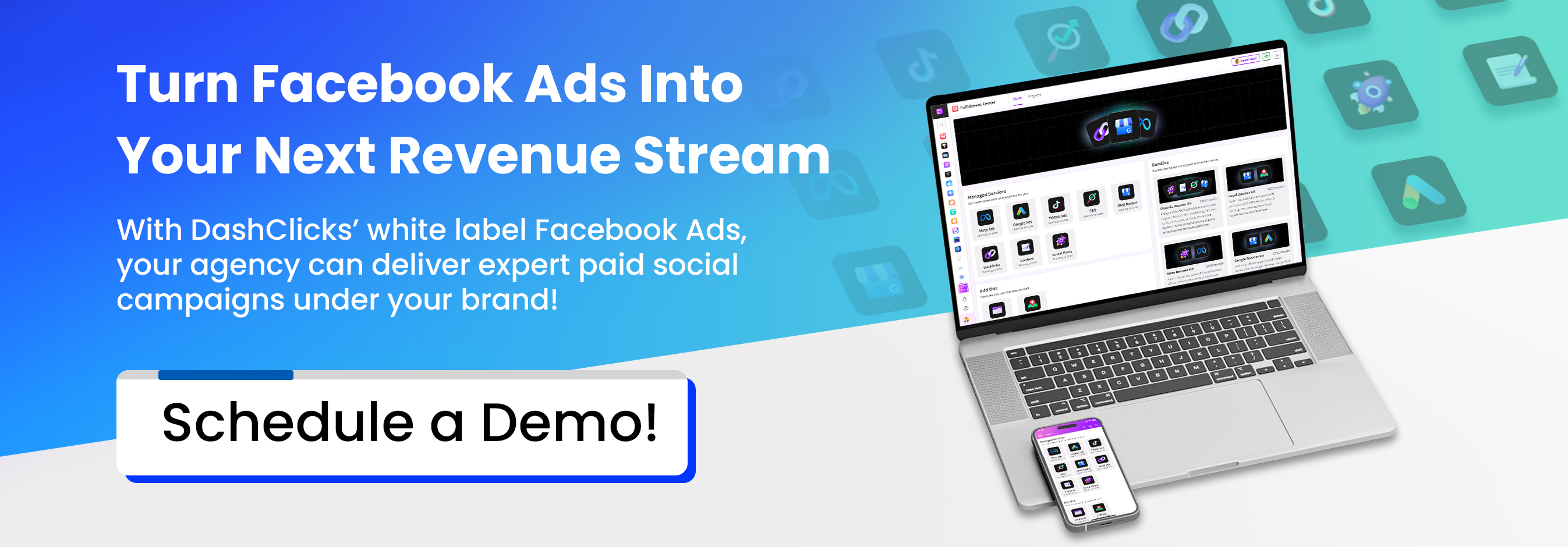

No results found.
Please try different keywords.
Get Started with
DashClicks Today
Get found online, convert leads faster, generate more revenue, and improve your reputation with our all-in-one platform.
.svg)
Unlimited Sub-Accounts
.svg)
Unlimited Users
.svg)
All Apps
.svg)
All Features
.svg)
White-Labeled
.svg)
Active Community
.svg)
Mobile App
.svg)
Live Support
.svg)
100+ Tutorials
.svg)
Unlimited Sub-Accounts
.svg)
Unlimited Users
.svg)
All Apps
.svg)
All Features
.svg)
White-Labeled
.svg)
Active Community
.svg)
Mobile App
.svg)
Live Support
.svg)
100+ Tutorials
.svg)
Unlimited Sub-Accounts
.svg)
Unlimited Users
.svg)
All Apps
.svg)
All Features
.svg)
White-Labeled
.svg)
Active Community
.svg)
Mobile App
.svg)
Live Support
.svg)
100+ Tutorials



.svg)
.svg)
.svg)
.svg)
.svg)


